Rinaldi Report

Amazing Stories
by Peter Rinaldi
I find some stories amazing. Recently, a visiting high school team came to Ferriday to play basketball.
As the teams were warming up in the gym, shots rang out. Nearby, but not close-close. Alarmed, the visiting team canceled their participation in the game, put their kids on the bus and went back to Bastrop. Safety first, right?
When I was coaching soccer at Natchez High and Alcorn 25 years ago, there were no shootings near games. But if there had been one, my thoughts would have been for the kids’ safety. I would have done the same as the Beekman coaches. You can always have another day to play.
But you don’t want your kids exposed to such risks, especially gunfire. And as coach, you don’t know if the guns and bullets will get closer and there’ll be more firing. You leave to protect your children. I didn’t really express much of my opinion on the post but I asked people to express an opinion on the incident.
While most people said the coaches acted properly to safeguard their kids, a surprising number, including parents of children, said… “The shooting was far enough away, no big deal.” “The police captured the shooter. They should have played.” “Beekman didn’t really want to play. If they lost the game, they would not be in the playoffs.”
My favorite comment came from a mentally deranged person who said I was a racist and Klan member for writing the story. Say what?
I thought the story was important because it shows how violence speeds community disintegration to the point that the safety of high school basketball is threatened. And I also thought the story was important because the Beekman coaches did not accept the threat as a ho-hum occurrence. They acted quickly and appropriately.
But I got a special bonus from running the little story on Facebook. Because I learned how really stupid some people are in our area. How they have no common sense and no judgment, and they are willing to put kids in possible danger. They don’t want to admit that gunfire on the streets is not normal and acceptable.
When bullets fly, people are wounded and die.

Should Natchez Follow Its Own Hiring Rules?
by Peter Rinaldi
Should the City of Natchez follow its own hiring rules? According to its own procedures, the city should allow the civil service commission to interview police chief applicants, and the commission choose the new police chief, subject to the confirmation of the Board of Aldermen. This is the procedure, codified by law.
Unfortunately, the mayor and aldermen ignored the law the last time. They hired the chief themselves, a violation of the civil service protections guaranteed by the city. Additionally, city leaders should’ve hired a chief who had the requisite experience as a supervisor of policemen.
Natchez rules state that a police chief candidate should be at least a captain wherever he or she works now and should be at college graduate. But city leaders decided to go the DEI route and hire a kind and comfortable black woman who did not have the credentials to be chief, nor did she have the experience. She was just a nice person with modest street and no management experience. Yet Natchez hired a police chief whose experience as a law enforcement officer was mostly as a public relations officer.
But city leaders ignored the normal qualifications for a police chief and hired her because of her successful public relations experience. They also felt, understandably, that if they hired her and bypassed civil service, that her loyalty would not be to the citizens of Natchez, but to the Mayor and Aldermen. And this is exactly how it worked out.
I always thought Cal Green did a good job for Travis Patten. She handled publicity professionally. I thought there were complications when she moved to the police department as PR director because the chief she worked for was not honest and a liar. You cannot be the PR director for a liar and expect success.
And Green’s tenure as chief was troubled. Lots of crime, shootings, break-ins, thefts. Understaffed. Couldn’t successfully hire new officers. Couldn’t train new officers and keep them. It was a mess and a nightmare. I like Cal as a person. But frankly, her years as a supervisor and chief were awful and she was not successful at all.
Now, if the mayor has his way, history will repeat itself, and another unqualified commander from the department will be made chief and the big mess will continue. You should ask questions like: Why, after five years in office, is this administration unable to hire and retain police officers? Why, after five years in office, is this administration unable to hire and keep a competent police chief? Why, after five years in office, is this administration unable to combat crime successfully? Why, after five years in office, is this administration unwilling and unable to accept responsibility for managing a successful police department?
Of course, and as a result, city leaders are actually contributing to the decline of the community. Their top priority should be public safety. And while the fire department is moving along rather nicely, it’s obvious there has been little progress made in policing. This is the direct fault of Mayor Dan and his crew of compliant Aldermen.
Most symbolically, Green provided city leaders with a rundown of crime stats two years in a row, proclaiming the city was safer, and within two days of each announcement, another shooting and murder occurred. Talk about karma.
As to the mayor and aldermen, some people and some managers are good at hiring. Some learn over time. And others never learn. They make the same mistakes over and over again. It seems like we’re heading in that wrong direction again. The city has its civil service commission rules to protect a chief and other law enforcement and fire personnel from political interference. The rules for applicant qualifications and hiring should be followed. That’s the law.
Honestly, I don’t expect the mayor and aldermen to handle this correctly. They are not capable and are unwilling to learn. They’ve done next to nothing to fight crime and dead bodies in the street do not affect them or their policy. It doesn’t take five years to realize you have police problems that need fixing.
But today, more than ever, is another good day to give out an award or a commendation. Let’s put a video on FB. We have unity, progress because we have the best and most wonderful people. Blah. Blah. Blah. Just ignore the dead and wounded. They don’t count.
Besides, they only get in the way of our magnificent success. Stop being negative. Realism and truth not wanted.


The New Jail: To Be or Not To Be
by Peter Rinaldi
Adams County Sheriff Travis Patten continues to say he needs a new $30-$40 million jail to house 100-150 prisoners. He doesn’t even mention anything about fixing the old jail.
But the situation has changed. Since Cotton became DA, the district attorney’s office had actually been prosecuting and convicting criminals, with the state taking over the housing and cost of the inmates once convicted. We were running 90-100 inmates when Collins was DA. Now through actually holding trials, we’re down to 55-60 inmates normally. We have exactly 60 today.
So why do we need a jail for 100-150 inmates, when there are only 60? I notice the SO is making fewer felony arrests than in years past. Is that because we have less crime, fewer criminals and the SO is doing a better job? Or is it because the deputies are not active enough to capture the many bad guys? I don’t know.
But the sheriff campaigns on being a successful crime fighter and if we take him at his word that the SO is competent, professional and taking a big bite out of crime, then that’s another reason why we don’t need a massive new jail. We have simply arrested the criminals, freed the innocent by trial and then sent the guilty to MDOC.
If the sheriff and SO are not competent and not successful at fighting crime, then we don’t need a new jail. We need a new sheriff.
It appears that housing inmates at Concordia is the best and lowest cost solution, even though Patten wants to keep a second smaller staff of jailers and inmates at the Adams County jail. Supervisors assume the sheriff is just trying to bleed the county of money by having two jails to force them to build the $30-$40 million extravaganza. So far, that strategy has not been working.
As I mentioned before, costs have been reduced since we’re down to 60 inmates. Adams County does not need a new jail. But it’s time to fix the old jail and remodel the SO for use for the next 50 years.

Adams County Jail Controversy
by Peter Rinaldi
Sheriff Travis Patten showed his hand this week, saying we don’t need a $10-$20 million jail. We need a $30-$40 million jail.
This is absurd.
Since Tim Cotton has become DA, the jail census of prisoners has been reduced from approximately 100 to 60. Most of those prisoners are being kept in Concordia and a few in Adams.
Travis wants a new fancy jail and a new office building for he and his staff. And his ideas remind me of Roman emperors building themselves temples to their own glory. Supervisors were relatively quiet when Travis proposed to $40 million jail this week.
Ricky Gray said let the voters decide. But if the voters decide against, will the supervisors raise taxes even more following the recent reassessment to build this jail anyway? Most of us would be happy putting the prisoners in a tent compound with a lot of wire around it.
And of course, Travis does not want to discuss the obvious, fixing the old jail. He’s saying the same thing the school board said. The school board said “the old high school is no good. Sixty years old. Let’s tear it down.” That was just a line, a con, to get a new high school and remodel the old high school. Travis is using the same technique. “Tear the old building down. Build something new.”
In fact, nearly any building can be rebuilt, renovated and expanded just like the one at 306 State Street. To finance a $40 million jail, would take a 25 year note and an extra $2 million a year for operational costs in addition to the $7-$8 million we’re already spending a law-enforcement and the current jail operations.
It would far surpass the $9 million Rentech land purchase boondoggle. Supervisors clearly do not have an extra $3.6 million a year to pay the note and operational costs. Nor do they have the extra money to fix the old SO building at the same time. Probably another $5 million.
Maybe it’s time for Travis to look for another job more fitting to his high status and grand ideas. He obviously does not fit well in Adams County anymore and has become too big for his britches.

Is Tax Relief Possible?
by Peter Rinaldi
When Adams County supervisors fired their county administrator in 2023, they didn’t make public all the reasons. But one of the big factors was that supervisors felt they were in the dark when it came to finances. The county had revenues of $32 million but spent $41 million, a $9 million deficit.
Anybody who runs a business knows you should check your monthly figures for revenues and expenses. But supervisors did not check and they blamed the financial disaster on their county administrator. Supervisors responded by firing her, cutting the budget and raising property taxes 16.5%.
Now just two years later, the county has managed to raise people’s tax bills by 20 to 30% through reassessment. And the county failed to lower the millage to cushion the big assessment increase. So in three years, for many locals, taxes have risen 36.5% to 46.5%. And some people‘s property has not been reassessed yet, so there is more pain coming. It’s pretty simple. Supervisors are not good with your money. And they’ve covered up their mistakes with massive tax increases. I talked to one supervisor this morning, who put all the blame on the school board. The school board spends wildly, of course.
But at least most of its money comes from the state and federal governments not local taxpayers. But his comments ignore the fact that supervisors are in charge of their own budget and responsible for their own spending. And they are absolutely ruining the cash flow of many poor and lower middle class taxpayers who have limited income and already feel pressed by taxes, car tags, and the general cost of living. I am very surprised supervisors did not lower the millage this year to compensate for the extraordinary increase in assessments.
I attribute this nonchalant attitude of supervisors to their own financial states. Each one of them makes $50,000 a year in their part-time job as a county supervisor. They get generous health benefits, Social Security benefits, and retirement benefits as part of their employment package. So they’re all doing well . And most of them have outside employment, too. They just don’t feel the pain of those who make less than they do.
I watch the supervisors meetings on YouTube every month. And I am always so surprised that voters would elect these magnificents to office. Cash flow, monthly expenses and revenues are seldom discussed. And no information is presented to them to give them a clue as to where the county really stands. Maybe they don’t care to know. Of course, any community that raises its taxes up to 46.5% in three years is a disaster. The leadership is destroying the economy and the balance between the income of households, the ability to pay, and the cost of services provided. When I watch the county leaders on YouTube, they have such disorderly meanings.
Meetings are run almost without Robert’s Rules of Order, the parliamentarian’s guide to running successful executive and legislative meetings. So the conversation drifts here and there, side issues are brought up, items off the agenda are debated for a long time and the basic work of tending to money is ignored. It is so disorganized. And incompetent. And that’s why they often have 2 1/2 to 3 hour meetings. Everything is out of control. Adams County is not run like a business, even a bad business. The board of supervisors gets mired down in the small details. So there is very little long-term planning.
The only remedy to this is to elect people who are competent and professional. People who understand money and finances. If you put Bozo the Clown on the board, you get Bozo government. Certainly, the board functions poorly, even worse than a few years ago. And the massive tax increases and over-spending are proof that this bunch do not know what they are doing. I have little confidence the supervisors as a group of five can fix this themselves. As they move from one self created disaster to the next, it is really up to voters to push them and make the changes necessary. And if you don’t make those changes, you will get more mistakes, more goof ups, more negative cash flow, and even higher taxes.
Tax relief would be possible, and you would expect Wilson, Gaines and Middleton to awake and help. Now that thousands of Adams County residents have had their property taxes increased dramatically through reassessment, that process will continue until all the houses and all the businesses are reassessed. The massive tax increase will not give you better services, but will give the county more money.
And the assessment affects how much you pay for your city share of taxes and school board taxes. There is only one real answer to this in the short term. There are three supervisors who have smarts and respect for the public. They can vote to amend their budget at any time. They can also lower the millage to reduce your tax burden and soften the blow from the high reassessment.
So will they let you suffer under high taxes or will they respect you and the economy and lower your taxes? I would suggest you call your supervisor and ask him to revise the budget and lower the millage. If you don’t act, they’ll just keep raising taxes. Will they do the right thing for Adams County?

Sniping from the Podium
by Peter Rinaldi
Natchez Inc.'s Chandler Russ and Mayor Dan Gibson criticized me at the recent aldermen’s meeting as an out of towner on the internet who is hateful, spiteful, negative and inaccurate in my reporting, specifically referring to the Rentech-IP land purchase of 12 years ago.
Adams County purchased the property for $9.3 million as sn industrial site. Chandler again stated this week that the purchase was a good deal and Dan jumped in to commend him for his good work. Their comments can be viewed on the aldermen’s meeting on YouTube. I don’t hate anyone and I have nothing to be spiteful about. But I get irritated as heck when the public is lied to or mislead by the political folks.
What is truth? Here it is. Our officials knew back in 2021–2022 that Velocys was on the ropes economically. The company had no chance of developing its plants in Ohio and Natchez, but Chandler and Dan kept saying the company was coming, when it was obvious the firm couldn’t do a $10 million project never mind $1 billion. Plus Velocys research could never prove it could make a FT synthetic jet fuel in quantity other than in test quantities. So even if they had the billion bucks, they wouldn’t be able to produce enough fuel to justify the investment in either state.
The Rentech debacle: Long before Dan came to town, I spent more than 45 years writing and commenting on local news. In 2012, Russ, Lazarus and Grennell championed the purchase of the IP property from Rentech for $9.3 million. I immediately commented at the time that we should allow Rentech to sell their own property and keep the property on the tax rolls. The officials responded by saying they already had some unspecified company in the wings ready to buy the land, but they couldn’t say who it was.
They even chimed in that the Rentech site had wonderful high producing water wells that could benefit new industries. What the officials didn’t say is that the company stripped the wells of all equipment and piping and then closed the wells. Sure, the water was still there in the aquifer. But to get water on an industrial scale, you would have to spend millions of dollars to redrill, repipe and place big new pumps at the wellheads.
Again, I stated let Rentech sell it. It was a lie that there was a company waiting. There was no one. Supervisors bought the land and taxpayers have been paying off the bond plus interest for years. I’m not sure if the bond is completely paid off by now. In that time, we had one small firm that located there. I believe it closed after a few years.
But there’s been no payoff, no return on investment on the site. No permanent development with hundreds of jobs. Zippo. It was empty, manicured acreage plus woods when IP owned its property. Rentech and the county did not maintain the site, so it’s become overgrown and seedy, a far cry from the spiffy landscaping produced by IP employees.
Russ admitted this week that one of the reasons the site has not attracted interest is because it is not shovel ready and there was environmental cleanup that had to be done and is ongoing. This is the first time any county official has said the site has problems, making it impractical for development until those unspecified problems are fixed.
Can you imagine going to a bank and saying I want to borrow $9 million but I can’t use much of the property and will not get a return on investment for 12 years? They would think you’re crazy.
I have no idea for sure whether the Rentech land purchase was just stupid people wasting taxpayer money or corruption or both. I followed the Rentech shareholders suit against the directors and officers and there was plenty of evidence presented that the Rentech bosses were crooks and scam artists. But I felt uncomfortable with allegations that Adams County officials participated in the scam, because there was just a single deposition of one Rentech lawyer who asserted such.
So without more confirmation you’re just left with not enough evidence that local Adams officials did indeed conspire to defraud. I am left with the actual evidence from Rentech bosses themselves that Adams County officials could be played and manipulated to the bosses’ advantage. City slickers take advantage of the country hicks.
I regard Russ and the mayor’s attacks against my intent and information as a bit cowardly. They’ll attack me but not mention my name. They slap like girly men. Lol. But what I’ve written before and today about the Rentech land purchase is accurate and truthful. I continue to write in the same manner as I always have. Provide the info for a commentary. Let readers decide on their own what they should think and believe.
But anytime our local public officials spin tales, mislead, exaggerate or lie, if I know about it, I will so write. My interest remains the betterment of the Miss-Lou. Economy. Society. Leadership. I want some progress. Those that mislead stand in the way of truth and that progress. I simply will not support politicians who lie to me or the public. I will check their statements for veracity.
This is my self-appointed job. And I take it rather seriously, as my final contribution to the communities I love before IU croak.

Concordia Schools Should Be Minimally a B
by Peter Rinaldi
The Louisiana Department of Education released Concordia performance scores today. Monterey A, Vidalia Lower Elementary C, Vidalia Upper Elementary C, Vidalia Junior High C, Vidalia High B, Concordia Education Center A, Ferriday Lower Elementary D, Ferriday Upper Elementary D, Ferriday Junior High C, Ferriday High B, Delta Charter C.Overall, the district rose from a grade of 72 to 73.6, a C this year.
I hadn’t quite figured out why Concordia public school parents roll over and accept a C grade of 73.6 as good, when the parish had 78 in 2015-2016? With the small school population and adequate resources, a B should be minimally acceptable. In that 10 years, the failing Ferriday schools have risen from F to D, not enough progress. And some of the Vidalia schools have slipped. The real success stories are Monterey which maintains its A rating and Concordia Education Center which has risen from a F to an A, a remarkable achievement. I’m also surprised that Delta Charter has not achieved a B.
The district has yet to recover to its pre-pandemic scoring levels. Any administrator or school board member who believes 73.6 is good and acceptable needs to be replaced. I don’t think C is acceptable. Mediocrity does not lend itself to creating successful, higher earning adults. I would be in a panic if my kids were in Concordia schools and would be moving in my U Haul as fast as I could to Monterey.
At this point, if you’re going to be a good and successful educational mentor to your kids, it’s Monterey, AC or Cathedral…or move. I don’t trust school administrators who tell me their schools are good when they’re not. I don’t respect liars.
These leaders throw the bull every year, clouding the atmosphere with propaganda to maintain their feathered nests. These administrators, many across our two states, have a common DNA. They are willing to run inadequately performing schools, year after year, and take the big bucks, turning a blind eye to results and real progress. They earn huge pay, benefits and retirement, while the kids under their supervision will suffer under the lifelong handicap of having an inferior education.
The kids in Concordia deserve better leaders and better schools. Yes, they do. And a school board that allows this mediocrity to continue is just as culpable as its administration.

Reading Between the Lines
by Peter Rinaldi
A recent commentary by Mayor Dan acknowledges the growth in crime in many communities, including Natchez, in recent years. He admits that there are cultural changes that are pushing crime into the forefront. Black teens and young adults are carrying guns and very willing to use them to solve their problems.
Dan’s solution is perplexing. He believes it’s up to the Legislature to pass a more specific law that would bind judges to specific bonds for accused felons. There will still ranges in the dollar amounts assessed for bond. But the judges need to tow the mark. His response to crime in Natchez is surprising because it shifts the burden of responsibility to the legislature in the state, instead of in the local community, where it belongs.
I interpreted this shift as his surrender to crime in Natchez. He did not suggest improvements in the police department, patrolling, hiring, training, crime mapping, roadblocks, a better police team and top management personnel. No suggestion for the PD. Nothing. PD is just about perfect. Of course, it’s the job of the PD to both respond to crime and prevent crime. And NPD cannot prevent crime because it is not capable. It is not capable because it does not have enough officers patrolling the neighborhoods. It does not capable because the officers do not have the number of contacts they need in the community and informants ready to provide information.
Additionally, a large part of the community on the north side of town holdmtrue allegiance with criminals and families of criminals. North of Saint Catherine St., Devereux Drive, and 61 North is the Dead Zone, where you’re more likely to be a victim of crime or end up dead.
In past, the mayor has asked for prayers to prevent crime, and even said he wasn’t going to permit crime. One time, he blamed The Natchez Democrat for scaring tourists away because they dared cover a shooting incident. The criminals weren’t ruining the community, the paper was. The problem of crime and an effective police department has been with us at least 15 years, long before Gibson took office. And so far, a series of mayors and aldermen have done very little or nothing in response to regular shootings, break ins and drug dealing.
This administration has given out an annual report with incomplete data showing the community is safer. For example, the police chief and mayor released statistics based on nine months of crimes committed. Last time I checked, 12 months is a year. Obviously, the crime statistics look better when you don’t count 1/4 of the year. Curiously, after giving out these reports in the last two years in the aldermen’s Tuesday meetings, there were shootings and deaths within two or three days. Reality got in the way of propaganda.
Five years ago, when I first met Dan at Dairy Queen, I thought he would be elected mayor. He had a lot of positivity and a bunch of spin, both necessary qualities to be elected. But when I mentioned the crime was the biggest issue that needed to be solved, he ignored me. As I got into our car in the parking lot to leave after the meeting with Dan, I said to my wife, “he’s not going do anything about the police department or crime. Nothing.” And so we talk about jet planes, the Eola, two shopping centers, good streets and many other positives. We give out awards. But we ignore our crime. So that leaves us where we are today. The city administration is not going to do anything about crime and the police department is going to remain ineffective.
And I don’t see any cultural changes on the horizon either. The pervasive crime mentality is part of our neighborhoodsbon the north side of town. The criminals out in the county know they can come into town and play without too much worry of getting caught. They have support. The city’s failure to stem crime leaves you with a few choices. 1. Put up with crime. It’s part of the fabric of Natchez society. 2. Move to rural Adams County where it’s a bit safer. 3. Move to Vidalia where it’s a lot safer.
As I assess the Gibson legacy so far, there’s been significant spending and borrowing to build up our infrastructure, streets, sidewalks, and City owned properties. Even though much good work has been done, and many grants obtained, the loans taken out to fund these improvements will still be on the books when it’s time to do another round of repairs. The city administration has benefited from tax reassessment on personal and business properties. This high tax rate will play a dramatic role in squashing economic development in the next generation. Many people are having their property taxes raised 50 to 100%.
Dan has built a constituency of white and black voters who respect the job he is doing, even if they don’t look closely at the finances, the propaganda or overpromising. I believe you will win his third term. And now he is making $100,000 a year plus benefits as a mayor, he can hang around for a few more terms to build up his retirement kitty
At the same time, there is always the opportunity to turn the crime situation around, if he or a successor mayor is so motivated. But so far, no city official feels it’s important enough to do anything about it. So the bad guys and bad girls will continue to shoot, do break-ins, drug deals and steal. It doesn’t have to stay like this, but it’s going to stay this way. As Dan mentioned, we should rely on the Legislature to push the judges around. That’s it.
Since we have a public unwilling to take responsibility to combat crime, public officials have no motivation to do anything about it. Of course, the results of this policy are more death and destruction, more unraveling of society. And most importantly, businesses and newcomers will look carefully before moving to Natchez, because there are so many other safe places in the South in which to work and live. Places where you don’t get hit on the head or shot and where police departments, prosecutors and judges work together to create safe communities.

Natchez-Adams County Criminals
by Peter Rinaldi
I don’t defend criminals. When law-enforcement arrests someone for a felony shooting, break-in, drug deal or theft, I’m glad. It means deputies or police have probable cause, evidence that the person actually committed the crime.
If the perpetrator is white, I’m not going to defend him. I’m not going to say his mental problems are pronounced and should be excused. I’m not going to blame his mama or daddy. I want the guy arrested and appropriate bond set. If he’s a baddie with lots of felonies, then I don’t want him out at all until trial. His crime and his behavior have nothing to do with my whiteness or his whiteness. It has to do with his actions and morality.
SPORTSMAN FISH & GRILL: Dinners Plates: Catfish, Chicken Tenders, Popcorn Shrimp, Fish & Popcorn Shrimp Combo, Oysters, Jumbo Shrimp, Combo Fish & Jumbo Shrimp, Combo Fish, Jumbo Shrimp & Oysters, Oysters & Shrimp, Boiled Shrimp, Shrimp Overload, Plates served with fries, slaw and hushpuppies. Be sure to try our great tasting Burgers, Po'Boys and Sandwiches: Bloomin' Onions, Taco Burgers, Salads, Sides, Kid's Meals, Desserts. Family Packages Available: Serve your family or party with fish filets, chicken tenders, cole slaw, fries, fried pickles and hush puppies! Family Parties & Events Welcome! 1598 Carter St., Vidalia, 318-336-8888. Sat.-Thurs. 11-9, Fri. 11-10. Dine In or Drive Thru. Order ahead by phone for large orders. GREAT FOOD & SERVICE AT FAMILY PRICES!
So likewise, if a black person commits a serious crime and you’re black, it’s no reflection on you. He’s the criminal idiot not you. And his arrest has nothing to do with his race. It’s a reflection of nature-nurture-culture. His immoral decisions are testimony to his upbringing, the criminal culture he embraces and his poor and evil decision-making.
If you stop seeing crime as white this or black that, and start looking at the situation as us versus them, meaning good guys versus bad guys, then you can leave all the racist garbage and recriminations behind.
Criminals who have a history of committing felonies should be denied bond or given very high bonds. Criminals who are convicted of a second, third and fourth felony should get maximum sentences. All crimes committed with guns should earn a five year enhancement penalty as provided by Mississippi law. If you want shootings to stop and reduce break-ins, thefts, and drug dealing, then you have to get serious about crime. Ignore race. Concentrate on the perpetrator’s current behavior and history.
No excuses.

Velocys and Natchez
by Peter Rinaldi
Madison Bidco, a UK investment consortium, agreed to purchase Velocys at the end of 2023, as Velocys was about to go broke and shut down for lack of capital. Velocys had originally agreed to build a $1.5 dollar biomass to fuels FT plant at the Belwood Industrial Park in Natchez, build another plant in Ohio, and do additional projects in Britain.
The company got so broke, it had to borrow $5 million in cash from Bidco to stay open and retain staff before closing. Bidco closed on the deal in Jan. 24 and said it would use $40 million to fund Velocys FT research projects.
Bidco took the company private.The Natchez and Ohio projects were put on hold but still considered possible. During 2024-2025, Velocys continued its biomass to fuels and commercial waste to fuels research for coming Uk projects.
But instead of building its own plants, it is using its German WW2 inspired synthetic fuels technology as a partner with other companyies’ plants not its own plants, limiting its risk.
The company shut down its Houston office. It has an office in Ohio and the phone is off the hook 24 hours a day. Since the company never built anything in Ohio and has no employees there, local officials there believe the company is not coming.
Velocys has recently deleted its mention of the Natchez and Ohio projects from its website. It is instead trumpeting its new projects in the UK instead, where it is a partner in other company’s projects.
I have called Velocys in the UK several times to ask about the status of the Natchez plant. I have not received a return phone call. I also asked Supervisor Kevin Wilson. He said, it was his understanding that Velocys still had its option to build at Belwood. He had not received any updates from the company.I signed up for email public relations releases from the company and sent an email inquiry for news about their Natchez plans, but no releases have been sent and there has been no response to my inquiry.

Expecting the Impossible
by Peter Rinaldi
Every time we elect the mayor of Natchez, we place on him unreasonable expectations of turning the economy around. One person cannot accomplish the miracle.
The mayor’s job includes running the organizational structure of city government, supervising the department heads and acting as the public relations guy for the city. That’s all he can basically do.
We are fortunate right now, that within the city limits, there are three potential economic development projects that a mayor can help and assist. But it’s still up to the actual developers to make things happen. The two shopping centers projects, Tracetown and near Walmart, have significant potential.
The third project, the Eola Hotel, will electrocute all who touch it. Of course, the downtown location is excellent, being in the center of town. But the building is total trash and anyone who tries to rehab it for a hotel or a living space will lose so much money. And if taxpayers get involved, they’ll lose money too, As I mentioned, all three projects have more or less fallen into the city’s lap, with or without a mayor’s help.
We’ve had two mayors recently, Brown and now Gibson, spend much of their voice on trumpeting improvements to the economy. Both went out on a limb to spread manure about progress. This is unfortunate because of both men had ability. But both men twisted the statistics to try to ensure reelection, causing them political damage.
And so I have objected to that technique of misleading people. At the same time, I support Gibson‘s efforts to improve the organizational structure and function of city government. He is a good public relations man. He has good department heads and is trying his best to lead the city forward.
Remember, he doesn’t have much help from the aldermen. With the exception of Valencia Hall, he has no real help. The rest of the bunch are of very modest value. I am especially pleased with the work ethic of Dan Gibson as compared to his predecessor Mayor “absent without leave” Grennell.
Darryl hardly ever came to work before 1 PM and he would just check for messages. He didn’t want to be a working mayor. He promised to bring everyone together, which he did. Because everyone pretty much agreed he was a lousy mayor, mostly due to a total lack of effort.
Right now, Natchez has a vacuum in terms of leadership. Dan is it. There’s nobody else on the scene that is as capable as he is. The World War II generation has passed. Many of the Boomers are retired. And the next generation has not presented a political leader of substance as yet. So Dan’s the man. Unfortunately, he persists in promoting economic achievements that are fantasy. Yes, he can assuredly say the economy is better than when it was shut down during the pandemic of 2020. That’s not much of an economic renewal. The statistics show in terms of jobs and population, the two biggest indicators of economic success, we are worse off now than we were in 2018 to 2019. That is the truth.
So I will continue to whack at Dan every time he lies to you. I will tell you the truth, and I will report the facts as they really are. At the same time, we are better off with Dan as mayor than anyone else I can see on the horizon. He does have skills. He does work very hard. He is able to keep racial tensions low by kissing butt. He smiles and is polite. He is diplomatic. Lots of sugar.
There is a natural public frustration, when a mayor has been in office for a term or two, that te economy is not working out. That’s because the economy always stinks, and that’s because the mayor cannot do anything to really impact the economy.
To turn around the economy, you would have to significantly reduce crime, or radically improve public education, improve the quality and numbers of the workforce, add to the availability of new housing, increase available capital, change the geographic location of the community and a few other niceties. You would also have to entice large companies to come here and they don’t want to come here because the workforce is crappy, the community is poor and we’re in the wrong location.
The Southern manufacturing revival that occurred post-World War II is not going to happen again here, because it was built on cheap labor. And cheap labor is now located overseas not in the rural South.
Gibson does himself great political harm by equating his administrative success with general economic improvements in the community. The only danger in his administration that I see is that the city is over-reliant on adding debt to make its infrastructure improvements. As you know, when you don’t have cash flow and you increase debt, you put your family, your business or your community in jeopardy. When you borrow a lot of money, you’re counting on an increase in income to pay off the debt in the future, as well as the rising cost of government itself. That is a big gamble. When Dan does finally retire or leave, there’s going to be a financial mess. That’s going to require budget cutting or tax increases or both to fix.
At the heart of it, you can’t make major infrastructure improvements to the city, unless the property tax base and the sales tax base and other revenues grow dramatically. And that growth has to be from actual growth not from just raising taxes, otherwise it’s counterproductive.
There are two editorial points of view when it comes to writing about the state of Natchez. The first point of view is that embraced by Dan and The Natchez Democrat. That point of view says things are good and things are getting better. And my point of view is different. I always believe that we need reform, change and improvement or we will continue to suffer and go downhill. You can decide for yourself which point of view fits you best.
I will continue to praise and credit Gibson, when it is merited. But when he tells a big one, I will let you know what is fact and what is truth and what is not. In the meantime, it is fair to say that he is the best mayor we’ve had in quite a while. And he’s not going to be able to improve the overall economy because of what I mentioned earlier.
Besides the economic disadvantages that we already have, we have great dysfunction in our community culturally. Our society has broken down in many respects. The mayor cannot cure societal dysfunction. That’s up to the people themselves.
Do the people want to get a good education? Do they want to work hard to achieve? Do they want to stay away from crime and criminals? Do they want to abstain from alcohol and drug abuse? Do they want to stop having babies out of wedlock? Do they want to keep their community clean and tidy? Do they want to dress well, behave properly, speak courteously and be good citizens?
These are things a mayor cannot control at all. We should always expect improvements, reform. Government should do a better job, but there will be no miracle. And as of now, I don’t see where the people of Natchez are as energetic or hard-working as their mayor. And I don’t see any movement toward cultural stability. Dan is not Moses or the Messiah. And if you really want a great community, then we have to change the way we operate, the way we behave.
It Is Surprising But Also Not
by Peter Rinaldi
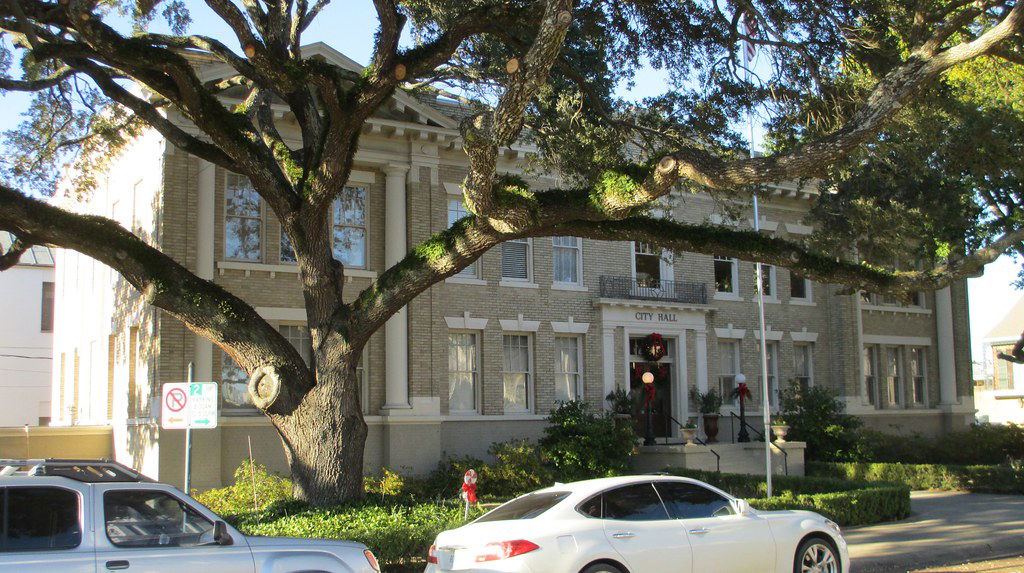
It is surprising but also not... Free speech advocate shot and killed. City of Natchez government does not respond. No codemnation of violence. No support for free speech or open debate. No suport for traditional relligious values.
Hundreds and hundreds of cities across the nation are taking a moment to reflect and demonstrate governmental support for those American values. Natchez cannot.
Why?
Because city government is the government of "cannot." It cannot keep its streets and medians tidy. It cannot pave streets properly. It cannot do its bookkeeping and accounting properly. It cannot fight crime. It cannot build a successful police dept. It cannot achieve without taking on big debt. It cannot stem the ouflow of residents. It cannot halt increases in taxation. Its officials cannot tell tithout taking on big debt. It cannot stem the ouflow of residents. It cannot halt increases in taxation. Its officials cannot tell the truth or stand for truth. It cannot stand for justice, unless it's a manipulative attempt to secure black voter support. It cannot do right because the politicians fear the rabble. It is surprising but also not... It is the government of "cannot."
he truth or stand for truth. It cannot stand for justice, unless it's a manipulative attempt to secure black voter support. It cannot do right because the politicians fear the rabble.
It is surprising but also not...
It is the government of "cannot."

Government Perpetuates Poverty
by Peter Rinaldi
Since the 1960s, the federal and state governments have made a massive investment of trillions of dollars to end poverty. A greater and caring society for a greater America…that was the idea. So if your family was failing economically, you were poor, then the government subsidized your living, with rent assistance, food, medical care, child care. If you became successful, the subsidy was reduced significantly or removed completely.
Rather than work hard and risk not making enough to make ends meet, many families, mostly single moms with kids, decided not to take the risk of losing benefits and decided not to work much or at all but to continue getting benefits. And the subsidies didn’t pay enough to really survive, so then it was necessary to hustle parents or grandparents for more money to subsidize the subsidy and/or move in a working boyfriend for extra cash.
You could’nt get married to the boyfriend.
Because if you did, then you would lose your benefits. And due to the stresses of unmarried relationships and not enough money for boyfriend, mom and child, more than 90 percent of those live in relationships broke up. Then mom had to get a new boyfriend with a new source of money. And trying to build a successful love relationship, the mom may have gotten pregnant by the old boyfriend, the new boyfriend or both.
Instead of government getting rid of poverty, the government helped it grow to become a permanent state of economic distress for many families, compounded by the irresponsibility of single moms sleeping with too many different single men during the child bearing years.
This is a national problem, magnified even more here locally, with 25% to 32% of households in our counties and parishes in poverty, with the most of those poverty households headed by single women with children. There are two ways out of this. First, you have to subsidize work not inactivity, helping low wage earners move up the ladder. Then you have to cut off subsidies to single moms who have more children out of wedlock. Once the single mom has a second child out of wedlock, she can no longer get benefits at all.
This forces her to work and pushes her to marry to maintain any kind of reasonable standard of living. It also forces her to be more sexually responsible, choosing partners more carefully, and using birth control. Instead of government subsidizing failure, it starts to subsidize success for low income wage earners. If the woman refuses to work, not a volunteer job, then she gets no benefits. If the woman has multiple children out of wedlock, she gets no benefits. Nothing. If she is working, is married and has multiple children, if she is still poor, she gets some benefits.If you pay people to fail, you will only get more failure.
So if you’re going to do subsidies for the poor for rent, food, medical care, and childcare, then you have to subsidize people who make the right choices. If this sounds difficult, remember, there were no subsidies of note in the 1940’s and 1950’s, a time when our poverty rate was much lower. People took care of themselves, with relatives and neighbors helping. Not government.

Natchez Education As It Is
by Peter Rinaldi
Natchez-Adams Supt. of Schools Zandra McDonald is correct when she says all of Natchez High should not be judged negatively because of one fight. Approximately 15 male students engaged in the brawl, very few.
At the same time, the instantaneous blow-up and pile-on behavior, where kids were punching, striking and kicking kids in the head, was terrifying. You could tell by viewing the video, some of the kids really enjoyed it, as they delivered multiple blows and kicks to their fallen classmates. Kids act stupidly.
And street and gang-like violence is more common. So what should be done? The administration should have announced the specific punishments the kids earned without mentioning names. It should have announced how many were arrested for what crimes, misdemeanors and felonies. What are the length of suspensions and disposition of the court cases once resolved? (probably still in process)
Additionally, all those students who kicked other students in the head could have caused serious injury or death. Those students should be expelled. The number of students so expelled should be mentioned.
Yes, yes. Zandra keeps telling us how great the kids Natchez Early College are doing. It’s true, they’re doing fantastic, earning their college credits, going on to both junior college and four-year college. A great success story.
The community is not worried about those kids, because we know they’re doing superbly. We are worried about the other kids who are not strong performers. The story about Natchez High is a story about massive spending on an an
Additional hallway safety is needed. nual basis, a new school, poor performance academically for most students, occasional violence and absolute nonsense coming from the administration and school board.
I still don’t understand why, after we spend $240+ million in three years on the public schools, the Miss. Department of Education numbers show that less than 1/3 of our student population is proficient in math and English, meaning at grade level, and 2/3 are below grade level, meaning they lack the skills they need.
If McDonald was the coach of the team or the manager of a profit-making business, she would’ve been fired by now for her obvious failures in leadership and poor results. And if your students are failing to meet expectations of proficiency, you are failing. And that means McDonald is failing. Paying her $150,000 a year to fail is embarrassing and disgusting, an outrage. These issues have nothing to do with black or white, but simple performance. How long will the community accept the fact that this school board and this administrator cannot cut it?
Is Adams County really willing to sacrifice the welfare of kids and their futures to keep incompetents in charge? For me, this is very personal, because I’ve seen this school system decline over the last 30 years. As a former Natchez High coach, I want the school and the students to succeed and succeed magnificently. But you will never ever get that success with the group that’s in charge now. They’re crucifying the kids, crucifying the community, so the leaders can enjoy their power, their positions, big paychecks and happy retirements.
Meanwhile, our community is sliding downwards economically due to the school system’s failure to educate students properly. It’s a rotten mess. And the kids who attend the Natchez school system are the victims. I intend to stay on this subject of school quality, spending and administrative leadership until it’s fixed or I’m dead, whichever comes first. And you should not be forced to shut up either.
Zandra and her buddies can cry racism all they want. Yes, the stupid people will believe her. And the rest of us will know in our hearts and minds that it’s sick and twisted propaganda to say such, when all everyone wants is a good school system that performs and not a bunch of lies and excuses. $240+ million spent over three years on 2800 kids and 2/3 of the kids not proficient and below grade level?
Give me a break! The fight went on for about four minutes without interruption from adults. School resource officers need to be rehired to protect students and staff. I don’t know why there were no teachers in that particular hallway when the fight happened, but if they’re not enough teachers to go around, then the school should install cameras.

Political Shenanigans and Real Reform
by Peter Rinaldi
Forty plus years ago, a few white politicians ran locally and part of their appeal to white voters was their racist mantra. It wasn’t “I’ll keep blacks in their place,” but “I know em. They trust me. We can keep whites running things, if you re-elect me.”
The obvious racist ploy was designed to keep the white incumbents in power, defeat more competent challengers and play on white fears. The technique worked quite well, especially when these sinister politicians hired black workers to campaign and spread money around to buy black votes. While they were playing the white fear game, they were actually encouraging black voter corruption. They often bought preachers, who in return for cash, said nice things about these racist white pigs.
The practice was very effective in city-county politics and led to a couple of guys getting reelected enough to make themselves wealthy by stealing. We also had back then a small scale redneck organized crime circle of a few men that were promoting gambling and gambling machines at local bars. Huge amounts of cash were coming in to the syndicate and every four years, one promoter in particular would spend over $100,000 buying candidates. I mean, he was "donating" to campaigns with cash, no checks. All under the table.
Susan Willey at The Democrat was the first to write about this stink of corruption. Her articles concentrated on kickbacks, land deals and government fraud in economic development. The crooks sued The Democrat and lost. The exposure led to the collapse of the Industrial Foundation (forerunner of the EDA and Natchez, Inc.) and the near collapse of the Chamber of Commerce. Several things happened as a result. Some of the thieves lost their seats of power. And the paper stopped investigating corruption because its legal fees were so large from defending the lawsuit. This was a few years before Miss Lou Magazine was born.
I remember C. E. Dossett complaining to me that none of his dealerships could get any county work, not one tire, not one oil change, not one repair. This was before bidding was required. All the county’s automotive and tire work was going through one competitor’s outlet at about $40,000 a month. And the supervisors were getting cash kickbacks from the repair shop. I tried to get The Democrat to investigate. But their last lawsuit was so costly, they didn’t want to investigate either supervisor corruption nor illicit gambling’s influence on local politics.
Susan later went to work at St. Mary and the era of toughly written editorials ended until I started Miss Lou Mag. And even then, it took me about four years to get the hang of good writing.
Recounting old history has some meaning even today. Most recently, Adams County bought the vacant Rentech IP site for over $9 million which it should’ve never bought. After Rentech went bust, stockholders sued the company and the officers, alleging fraud and corruption. Depositions in New York State indicated a number of Adams County politicians were on the take as part of the deal. However, those depositions were never submitted to the court, and I wasn’t sure if the lawyer that testified was telling the truth, the whole truth and nothing but the truth, or whether his testimony was jaundiced to protect his own butt. I feel confident to say that Adams County politicians did get money and other incentives from Rentech. But I don’t feel confident enough in the story to actually print names and the amount stated in the deposition, because I don’t have additional confirmation. By the way, we’re still paying for that $9.2 million loan on the IP property.
What’s changed over 40 years is that now the majority of voters in our community are black. So there’s no sense in trying to preserve a white majority or white minority power. Because no such power exists anymore. It's done.
But what you see in local politics today is the absolute complacency of the black electorate. After all the struggle to get blacks registered to vote in the 1960s and to elect black office holders from the 1970s to today, black citizens are just fine with electing anybody to sit in office, no matter how stupid, ineffective or corrupt that person is. It often seems like all black voters want is a black body in the office. They don’t seem to care whether the person is intelligent, honest, hard-working or even competent. If he or she is black, that’s simply enough.And if you're black and criticize one of these awful politicians, then you're a traitor to race and the cause. And if you're white and criticize a black politician, then you're definitely a racist.
This dumb attitude certainly reminds me of the 1970s and early 1980s, when white voters' biggest fear was electing black politicians. So the whites would place their trust and vote in people they knew were lousy and incompetent.
I’ve written many editorials over the years on how City and County leadership has been lacking. Just think of it like your family. If husband or wife is a screwball, chances are your family is not going to operate too well.
Here in our community for many years, we’ve had a declining economy. And our response to the declining economy has been to elect incompetent and corrupt politicians, and oh yes, reelect them several times. I don't think that's a strategy for success.When you're in a mess, you need somebody to fix the mess, not make it worse. And if you think that's the way it's always been and will always be, you've got the wrong attitude.
Vidalia had its own messy mess a few years ago. Misspending. Incompetence. Corruption. And it got fixed by Buz and the Buzettes.
The same can be done in Natchez-Adams. Stop making excuses for liars and incompetents. Then elect people who are smart, hard working and not bull-throwers. It's actually that simple.

A Just Society
by Peter Rinaldi
We often think of a just society as one that makes sure the innocent are not convicted and the not guilty go free. But a just society is also one that arrests repeat felons, tries them, convicts them and sends those who have earned punishment to jail.
Natchez Adams County has been an unjust society.
While law enforcement did arrest the perpetrators, it has been quite common for repeat offenders to get low bonds and re-enter the streets to commit more crimes. Those bad guys also been given light or suspended sentences upon conviction, the most notorious being Judge Debra Blackwell’s suspended sentence that she gave to an admitted rapist who had raped a teenage girl. On that sentence alone, Blackwell should be removed from office by voters.
We have also had great difficulty with our previous district attorney, Shameca Collins, who was not committed to prosecuting repeat and dangerous felons. We have been a very unjust society, because criminals were favored, and victims were not cared for. Prosecutors and judges were incompetent, and as a result, criminals have nearly destroyed our community.
As one victim of crime said to me, “Judge Sanders was the criminals’ best friend. She let more people go to do more damage. She was really the worst criminal we had.” When you have an unjust and weak judicial system, corrupt defense attorneys play games to get their fiendish clients out of jail. They go into judges’ chambers and beat on the judge until she succumbs to an easy bond.
District attorneys and the judges work together to ease their caseload and work less by accepting plea downs on dangerous criminals. Society is destroyed because these prosecutors and judges are not doing their job while being paid more than $100,000 a year, goofing off most of the time. They lead extra fine lives while the community suffers.
Now in justice court we have Danny Barber, who is applying justice the way it should be applied. And we have Tim Cotton as district attorney who is working hard to take care of the back up in caseload and get convictions for our serious offenders. Both men are doing an excellent job.
But our former weak and incompetent district attorney, Shameca Collins, is now a justice court judge, causing havoc once more. She needs to be removed by voters because she will do nothing but harm the cause of justice. She has proved to be incompetent.
As I said before, Blackwell also needs to go. it’s too early to say whether Judge Carmen Drake will be a good judge or not but certainly she is better Lillie, who was the one woman crime wave with a gavel. A just society is important.
When law enforcement, the prosecution and the courts work together to protect us from serious criminals, justice is served. The community is protected. The community can bounce back and grow. Without this protection, Natchez Adams County falters and declines. We must have justice!

Sand in Your Eyes
by Peter Rinaldi
Look at the headline in Dan’s article. He argues that ineffective state laws contribute to our local crime outbreak.
Wrong.
Actually, what we need is judges who set appropriate bonds for repeat felony offenders. And we need circuit judges who do not reset bonds and lower the bond amounts, listening to the pleadings of sneaky defense attorneys who go into chambers, quietly and privately, and get their crazy felons out of jail. Those arrested with the history of felony crimes or arrested for gun crimes should not be given bond at all.
Rules allow judges to withhold bond entirely if the criminal is a flight risk, likely to reoffend or a threat to public safety. The judge can consider both the arrest and the conviction record in determining bond. It is often in the case that a criminal out on bond commits another felony crime. Then he goes to a bond hearing and gets another bond and is back on the street.
Sometimes the prosecutors do not inform the judges of the history of the perpetrator, including recent arrests. It means the judges and the prosecutors must do their homework together and find out the history of the perp before the bond hearing. As to sentencing, if you give repeat felony offenders light or suspended sentences, the community pays for it quickly, because the offender comes out and violates again.
All those convicted of gun crimes should receive the maximum sentence allowed by law. The state also provides for an extra five-year penalty for those who commit crimes using a gun. The enhancement is added to the sentence for any other crimes the convict has committed. Mississippi has lots of appropriate penalties for a dozens of major offenses.
We don’t need crime reform. We need Adams County judges to simply use the laws that currently exist to protect us.
Too many plea bargains subject the public to even more mayhem. Serious felony offenders plead down to lesser offenses. Charges are dropped. Sentences delivered are light. A judge has the right to reject any plea bargain and force the prosecution to go to trial and they should force such prosecution, when the plea bargain does not protect public safety or punish the criminal adequately.
I will commend to you the work of Judge Danny Barber and DA Tim Cotton, who are doing the job the way it should be done. They are protecting the public. They are newly elected, and we are happy they are there.
Dan is blowing smoke again. He has succeeded in many things as mayor. But he, the aldermen and police have failed to secure public safety. And it’s not because the laws are bad. It’s because police do not do their job, nor do the courts and the city has been unable to hire police chiefs for some time who are effective.
Overall, over the past generation, NPD has been ineffective and failing. The public knows this, and the criminals know this. At the same time, we have had some outstanding local officers that have done a first rate job. But they have not been in the majority. The problems of effective law enforcement and appropriate bonding and sentencing have been a problem long before Dan Gibson ever came into office. Dan could tell his city judge to start putting repeat shoplifters in jail. While that’s only a misdemeanor, jail time is allowable by law. That might help a bit.
I’m sure The Democrat will promote this misleading commentary written by the mayor. But I will not. We do not need state reform. We need local enforcement of current law, appropriate bonding and proper sentencing. We need local reform.
However, if Dan writes a commentary about what he and the city intend to do with police department reform, training, motivating, hiring, patrolling, crime mapping, undercover officers, road blocks, departmental leadership, budgeting or city court reform to curb violence and property crime, I will be happy to publish his commentary. But blaming state laws is just a bunch of garbage.
And we all will welcome any administrative changes he makes to make the community safer. I am simply not going to publish his bull-throwing and misleading statements anymore, even though I support his general administration of the city.
The city’s primary job is to provide public safety. It has failed to protect the public from our criminals. And failed, absolutely! The only way Dan can lose his seat is if he has an opponent who campaigns on crime and crime only. The entire city is sick of the plague of criminals and the lack of effectiveness of the part of city officials to deal with it.
And people can see when sand is being thrown in their eyes. Our vision is better than Dan thinks.

Get Tough on Gun Crime and Criminals
by Peter Rinaldi
There’s this false reassurance in Natchez white society that nearly all of the shootings are black criminals shooting other black criminals, and therefore, white people in good neighborhoods don’t have to worry.
“It ain’t coming our way!”
This is a false assumption. While it is most true that black shooters are shooting black victims, several dozen of the relatively recent victims were innocent victims of crime. They weren’t criminals. They were just good, young people in the wrong place at the wrong time and were wounded or killed.
Two of my acquaintance friends, white and well to do, have sold their ritzy houses in downtown and moved away. They lived more or less on the borderline of the white and black neighborhoods. And they were tired of having bullets strike the masonry or fly through the windows. Both husbands and wives felt threatened. So they left.
The attack last week near the Natchez Grand is a reminder that the thugs have cars, guns and cell phones and they can hunt down their enemies without interference from law enforcement. And while police believe only one person was wounded, the news story could’ve been easily one or two killed and two or three wounded, including tourists and locals, black people and white people.
Fortunately, many of the shooters are not practiced at shooting and many of their bullets go all over the place. But as you noticed from the news coverage recently, the thugs are starting to use assault rifles and pistols that have been illegally converted to fully automatic. That means the attacks can be potentially more deadly.
Bullets aimed or shot wildly can hit anything or anybody, vehicle, house, child, teen, senior, black, white, green. It is just a matter of time before the wounded and dead include black and white folks, shot by the gangsters and terrorists. We’ve had some close calls already.
I’ve been very disappointed that the police and sheriff’s office have not been able to stem the tide of violence. There have been speeches and prayers and a lot of bull from the microphone, but there has been no improvement in patrolling or policing tomstop the outbreak of shooters. Nobody’s expecting the mayor, the aldermen or the supervisors to have an effective antidote to the violence. They haven’t done anything in the last four years and they’re not going to do anything. At least you can say they kept their campaign promises. They didn’t promise to fight the violence before they were elected. And they have done very little to combat the violence since being elected. They simply ignore it, other than speeches.
We still have bonding and sentencing problems. Felons with weapons, criminals with stolen guns,and criminals using guns are not always given the appropriate bonds and if convicted, There are far too many suspended sentences or light terms for people who are hardened criminals.
We can’t give easy bonds to people who commit gun crimes. Between the time they are arrested, bonded out and go to trial, it can be up to two years. In that intervening time, they commit a lot more crimes while they’re on the street waiting for their trial.How many times have I run stories about criminals bonded out for a gun crime only to be arrested later for another gun crime? Dozens of times.And it doesn’t matter at all whether the thug is black or white or the victim is black or white. The only thing that matters is...,are you going to gang up on the gangs and arrest the drug dealers and shooters and put them in jail for long terms? The color of the shooter or felony offender doesn’t matter. What matters is what he’s done that merits jail.Are you going to use the five-year gun enhancement penalty offered by the state of Mississippi to send these monsters to jail?
I am really sick of the plea bargains that are offered to people with gun crimes. Or their felony crimes are watered down to misdemeanors. We should prosecute these people to the full extent of the law. As long as it’s a gun felony, the guy has to go to jail and for a long time.
When I was in Natchez this last time in May, my wife and I stopped at La Fiesta like we always do. I was talking to an old friend who had recently moved back to Natchez for his job. Both he and his wife were extremely excited about their healthcare job opportunities. But she said, almost casually, “We’re at the Mark right now and we’re looking for a house. But we’re not going to buy one in Natchez. We’re looking in Vidalia, because it’s safer.”
What does that tell you? How many people are leaving because of crime? How many people are not coming because of crime? How many people are not investing because of crime?
To me, Montebello is a symbol for this story. When I arrived in Natchez years ago, that subdivision was full of people who kept their yards looking good. It was an inexpensive place for people to buy a house. A lot of young marrieds moved there for their first house. And there were a lot of seniors who had been there for many years. It was safe, lovely, a good place to raise kids.
Now the shooters are there. The drug dealers are there. Houses are falling apart. The place is unsafe. And it’s going the way of Roselawn, but quicker than I thought it would.
Why do you think I stayed at Virgil‘s hotel in Vidalia instead of staying in Natchez when my wife and I came to town? I may be old, my body half broken. Sometimes I feel my age, but my wife is only 57. If the thugs actually got to me, I have lived a good life. But my wife has many years of ahead of her and I want her to see them all in safety.
I love Natchez very much. But I would prefer my wife not be a casualty of my affection for my adopted hometown.High bonds and no bonds, tough sentences for all gun criminals.
We have to change the way we’re operating, both in policing and in the courts, or we will never get rid of this plague.
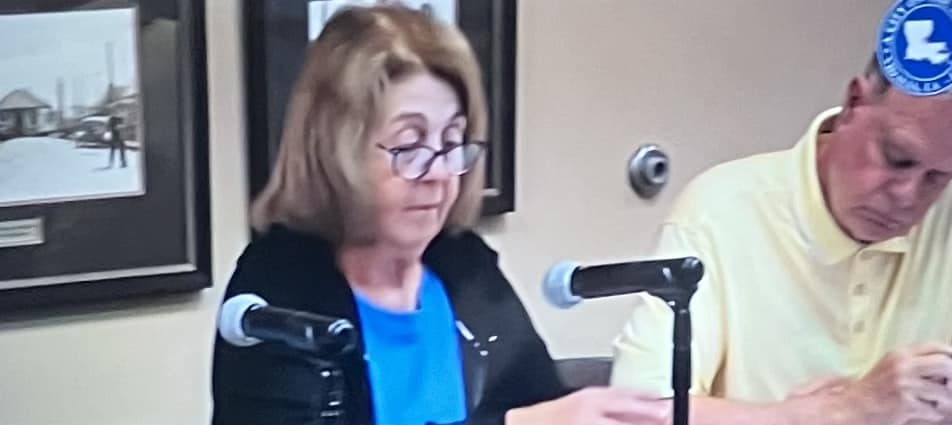
Debra Moak
Magnificent Moak and the Vidalia Way
by Peter Rinaldi
One of the first things Vidalia Aldermen heard at their recent meeting was a detailed revenue, expense, and fund balance report from accountant, Debra Moak.
The town remains incredibly financially healthy due to careful spending and holding in reserve much of the Hydro funds. With anticipated revenues of $51 million and expenses of $42 million, the town shows a good surplus and has more than $20 million in restricted and unrestricted funds available. Debra went into a lot of detail on the budget and spending, so those who were in the meeting, both aldermen and the public, could pick up necessary information. This is the way government should be run! I wish other towns snd public agencies were on the ball like Vidalia.
It is amazing the difference in professionalism when you cross the river and listen to what’s going on financially in Natchez and Adams County. First of all, in Natchez-Adams, there are practically no financial reports whatsoever, for the month, for the quarter for the year. Nobody asks about cash flow, revenue or expenses as to the big picture. They will often ask about individual expenditures. But there are no monthly reports or year to date reports that would be most helpful.
The city of Natchez runs its meetings on a strict agenda, thanks to Mayor Dan. The clerk does tell aldermen what expenses they have to OK for the month. But there is no discussion practically ever about where the city stands financially and where it is heading. No specifics! The Aldermen are in the dark and so is everyone else. I assume the city clerk and the mayor keep tabs on it. That’s merely my assumption.
Adams County supervisors continue to run meetings as a free for all. Supervisors jump in on the discussion when they feel like it, get off message and off the agenda every meeting. It’s more like children gossiping than a serious meaning discussing issues. I’ve almost never heard a supervisors’ discussion of revenue and expenditures and cash flow, except at the annual budget time, and by then it’s too late to really do anything for the current fiscal year. This lack of care was manifest two years ago. Supervisors weren’t paying attention to the budget and neither was the now ex-county administrator.
They overspent by more millions of dollars and didn’t even know they had done so, with so many financial miscalculations. They also complain miserably in private about the sheriff’s overspending, but never do anything about it. They don’t bring it up in open meeting and they don’t curb the excess. They complain privately and keep their mouth shut. They did wake up from their doltish behavior and raised property taxes 16% in one year to cover a budget shortfall. Oops!
I’m hopeful this will change with the new county administrator, Mitzi Conn. She’s a sharp cookie, as the thing goes. And I am hopeful she’ll keep those bozos informed.
Ferriday is always a nightmare…finances always broke, always spending too much, always short of cash. Alderwoman Gloria Lloyd seems to be the most informed when it comes to money over the years, but the town could use monthly in quarterly reports just like Vidalia. The last Ferriday mayor had no money sense whatsoever and hid problems. I’m hoping Mayor Alvin Garrison will bring a little more attention to the revenue and expenditure picture. Monthly reports are needed.

Financial Reports and Road Repairs
by Peter Rinaldi
The Concordia Parish Police Jurt is supposed to conduct an annual audit, like other public agencies in the parish and around the state. The jury continues to have problems getting its materials together, submitting the data to the CPA and actually preparing the audit.
As a result, no report has been submitted to the state for 2023 or 2024. Having a report timely filed would also help the jury monitor its finances, bookkeeping and accounting practices. The lax attitude toward accounting has been reflected over the years in the number of negative findings found in the audits. However, the number of findings was significantly reduced in 2021 and 2022.
The CPA has repeatedly advised the jury to have more than one person handling invoices and writing checks, and the two signature should be on the checks. This is to make sure that invoices are correct, properly documented and the checks themselves are accurate. Having two persons sign checks can also help prevent errors or fraud. The last audit showed the jury with a cash surplus and significant cash reserves, which was good. But the jury does not issue monthly or quarterly revenue and expense reports to the public.
Consequently, here is no information as to whether the jury is now in good shape or poor financial shape as of 2024-2025. I was asked if the jurors actually know their financial condition for 2024-2025. I could not answer the question, because cash flow is not discussed in the jury meetings. Residents have been complaining for years about the poor condition of paved and gravel roads, with some roads were receiving little or no maintenance since the 1960s and 1970s.
The jury had enough resources in 2022 to do a modest paving program, but chose not to. Whether it is financially able to do so now is uncertain. No reports have been released to let the public know if the jury is flush with cash, broke, in financial trouble or financially stable.
Concordia jurors would be wise to follow in the footsteps of the Vidalia mayor and aldermen, who provide accurately monthly and annual revenues and expenses and submit their audits on time. The public knows exactly where Vidalia stands financially. Up-to-date reports are provided monthly to the voters and if someone wanted detailed information, they could get a print out at City Hall on demand. But as to the jury, citizens are supposed to guess or accept vague assurances. Taxpayers are kept completely in the dark.
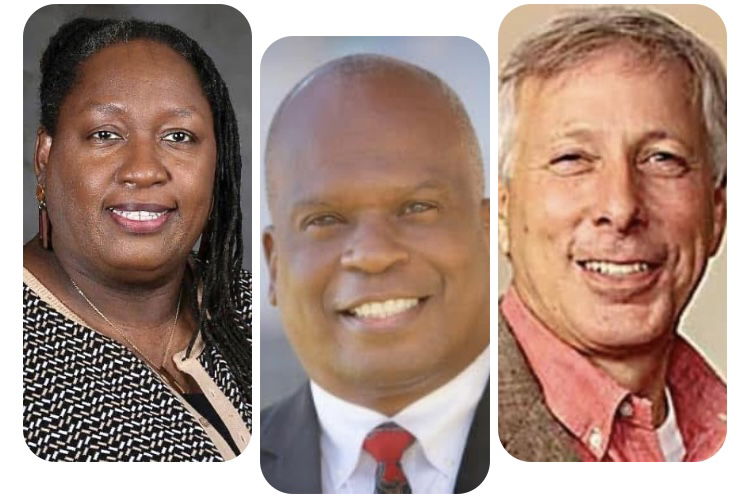
School Budget and Leases Questioned
by Peter Rinaldi
Superintendent of Schools Zandra McDonald and her school board team at the Natchez Adams School District want another $400,000 from the supervisors this year to fund local education.
Supervisors have several options. First, they can pass a tax increase to fund the extra $400,000. Second, they can also absorb the $400,000 into the county budget and cut some other spending to avoid the tax increase. There’s also a third possibility. The Adams County Tax Assessor Larry Hughes has been busy reassessing properties. That reassessment automatically brings extra revenue to the county, city and schools.
There may be enough extra funds coming in from the reassessment to avoid a tax increase altogether. Hughes will present a completed tax roll to supervisors on Aug. 4. At that time, he and supervisors should know just how much money is coming in from assessments and reassessments.
I sent a note to Adams County Supervisor Kevin Wilson this afternoon, asking what the his board of supervisors will do. Wilson replied that taxpayers can’t afford any tax increase. He does not support any tax increases.He added the schools are wasting an inordinate amount of money by keeping open the schools that are not occupied. The district is also leasing the vacant schools at way below the market rates, which increases negative cash flow. Wilson said he’s not satisfied with the oversight and management of the finances of the schools, indicating that taxpayers are abused. He supports the philosophy that a ‘quality education should include proper management of facilities and finances.’
Wilson raises an important point. The schools should manage their facilities wisely when it comes to maintenance and other costs. Case law and Miss. Department of Education directives say school boards are supposed to exhibit a fiduciary responsibility toward the use of their buildings and lands, meaning for the best use of students and education, maximizing revenues available to the districts.
The improper sale or lease of school district lands and assets has traditionally been an ethical and financial problem for many school boards across the state. The state has said in this past that schools must lease their 16th section forestry, hunting and oil lands at market rates. The state does allow schools to lease their properties to charter schools, which are public schools, at below market rates. But there doesn’t seem to be much case law as to whether the Natchez school policy of leasing their schools for a dollar a year is legal or not.
The very low lease rate means taxpayers are subsidizing the tenants that occupy the public schools. Those tenants aren’t even paying the cost of grass cutting and utilities.
McDonald and the school board feel it’s appropriate to “gift the use” of the schools to community nonprofits. Of course, taxpayers are paying for those gifts, side deals, and below market leases for the friends and acquaintances of the school district management team.
The school district had a budget of $39 million in 2019, serving 2800 students. This coming year’s budget will be $72.6 million, also serving approximately 2800 students.

Does the Mayor Tell the Truth?
by Peter Rinaldi
Dan Gibson says in his weekend newsletter: "Mayor's Desk -- Natchez Population is Booming, Population Growth. This great news: statistics are finally catching up with our Natchez Renewal. We’ve known we are growing, and we finally have the data to back this up. Like many cities, Natchez did not fare well in the US Census completed during the national pandemic of 2020 and prior to the beginning of our administration. Response rate was poor, and the snapshot taken of our statistics at that time were “pre-Natchez Renewal” and accounted for none of the growth we have experienced since the fall of 2020. For a better picture of what is happening in Natchez, we sought out a more recent census study by the nationally respected firm Cubit Planning. Its numbers confirm what we are witnessing every day: Natchez is growing – for the first time in many decades. Cubit’s study shows that Adams County, Mississippi, of which Natchez is the county seat and only municipality, has a current population of 29,208."
My response: Now let's look at the actual facts. Here's what the services say for Adams County:
U.S. Census
1980 38,305
1990 35,356
2000 34,340
2010 32,297
2020 29,538
2023 est. 28,746
Other data services
2025 World Population Review 29,204
2025 NCA Stats 28,795
2023 FRED 29,098
2025 Niche, Data USA 29,098
So is Dan stating the truth, fibbing or outright fabricating or misleading? You decide.
The Census is the only service that actually counts people, using interviews, forms, and records from SSA and immigration, checking state birth and death records, monitoring moves and dual residences. All the other services extrapolate and estimate. The Census does estimates between the 10-year Census. The next official counting will be in 2030. Cubit is a service that estimates and extrapolates.
I would guess that Dan chose to use Adams figures and not Natchez figures because the Natchez figures show a decline in population of 3% since the last Census, according to Cubit, the service he likes. Hard to argue growth and renewal when the city population is declining. The Census and other services also say Natchez population is declining.
Natchez
2020 Census 14,520
2022 Census est. 13,812
2025 World Population Review 13,599
2025 Cubit 14,082
2025 Population. US 13,918
Conclusion: Dan correctly quotes Cubit for Adams population, but does not includes the data that shows contrary evidence of population decline. He is Mayor of Natchez but quotes Adams figures instead of Natchez, because the city figures are awful. He tries to lead you to believe there is renewed growth and prosperity, but the population data does not show this for either city or county. He gets credit for his Cubit quote, but the rest of his talk is misleading and inaccurate and generally not persuasive because he eliminated data that does not support his premise.
His premise of growth is absolutely contradicted and false when city of Natchez figures are included. He conflates Adams figures with the premise of Natchez results.Award: Dan's statement earns 3 out of 4 Pinocchios. Not so good.
Remember also, increase or decrease in population is not just people moving in and people moving out. Births and deaths in the local figures play a role in the numbers. Those additions and subtractions are not necessarily economically indicative.

Mayors Can't Fix the Economy
by Peter Rinaldi
Mayors are elected to run city governments not fix a broken economy. Both Butch Brown and Dan Gibson ran into trouble when they tried to overpromise what they could not deliver economically.
In 2019, Darryl Grennell was mayor and we had 10,370 jobs in Natchez-Adams County. During Darryl’s tenure, the job numbers ranged from 10,260-10,510. Today, Dan is mayor and we’ve got the highest job numbers we’ve had in his five years in office, now 10,160. So we have 210 jobs fewer than when Darryl was boss.
When Anna and I met Dan five years ago at DQ in Natchez, I did mention the history of mayors overpromising when it comes to economic development. Butch was not the only mayor to so suffer. I advised Dan to concentrate on the core responsibilities of city government; police, fire and public works. He listened but not closely. I could tell at the time he was not interested in my view or assessment. That’s fine. It was his campaign and his job not mine.
It’s fair to say we’ve made progress in fire protection and public works, including streets and public facilities. Much of this has been accomplished on borrowed money, which taxpayers will have to pay back, both principal and interest in the future. The reason this has been accomplished with borrowed money is because the local economy is not growing. There are not enough new businesses and homes to increase tax revenues and give the city more money to spend on projects. Sales tax collections have not risen in two years, and they are actually down a bit. The city gets more property tax revenue, only because the county tax assessor reassesses properties upward, not because of growth.
And of course, the police department and crime fighting are a big mess. Dan and the aldermen have not been able to make much progress in this area, although the number of shootings has declined since 2018, when 18 people were shot and murdered in Natchez-Adams County.
A close associate of mine as always called Dan "the fairy-taler." Because he tells fairytales. That’s only a bit of an exaggeration, but not by much.I expect Dan to win a third term. But I do not expect progress either in the management of government or in the economy.
think we have gone as far as his abilities will take us. Dan will continue to be the public relations man, the smiling face, the photo-op guy. He is ambitious, wants to make progress and has done an excellent job of bringing Black people more into close proximity of their city government. That’s important. Natchez is a majority Black town, and its people need to feel that they’re part of the action, included and their views important.
There is rising dissatisfaction with Dan. No one is expecting him to part the Red Sea, and like Moses, lead us to the Promised Land. But his constant bull-throwing and over-praise of citizens is undermining his integrity, where people stop believing in the things he says that are actually true and do not trust him as being honest or accurate in his assessments.
Overall, his management of city government is legions ahead of what Darrryl did, who was lazy and often did not work at the job. Citizens have a tendency to be very critical. That includes me. However, in retrospect, I believe Dan has been a positive change, a good mayor for Natchez. However, the bull-throwing is tough to take.
As I look back over the years and assess real economic progress, you would have to go back to the Jake Middleton administration to find it. Back then, the aldermen were dead set against the new casino, what became Magnolia Bluffs. Middleton felt two casinos would be better for the community,with property tax and gambling tax revenues to help fund city operations. He was right, and the aldermen were wrong. I don’t know if I’ll ever be able to write the story of how that was accomplished, turning the recalcitrant aldermen around. But in the end, Middleton was correct. Isle of Capri faded away and Magnolia Bluffs poured money into city government by the millions of dollars much more than Isle had ever done.
Magnolia Bluffs Casino opened in 2012, and with its hotel, brought more than 300 jobs That’s a long time ago now. Before that, the CCA prison brought 400 jobs in 2009. Those were the biggies, 13 and 16 years ago.
We may get economic development sooner or later, but I don’t think it’ll be Dan who is delivering it. He’s had five years in office without much economic progress. And the Eola project is simply a sinkhole into which money is poured without result.
In the short term, Jimmy Smith's Tracetown Shopping Center rebuild offers the best prospects for growth. The new center could add 50-100 retail jobs, full and part-time, depending on which stores locate there, and if they are successful.

Population Trends Say It All
by Peter Rinaldi
Adams County population
One of our local politicians criticized me yesterday, saying I’m not telling the Good News about the economy. I reminded him that I was the only media person to report that Adams County has 520 more jobs this spring compared to last year at this time.
I also stated that a seasonal bump up or temporary gains does not make a strong economy. And the most accurate indicator of economic growth or decline is population. When the population grows over 10 or 20 years, that means people have made a long term commitment to live in a community. And they have the jobs and resources to maintain their lives.
Unfortunately, the Adams County population figures show a decline over many years and a corresponding decline in jobs as well. I conclude that local government is not doing a good job.
First, local government supplies mediocre services at a high price. Second, it taxes people and businesses exorbitantly, consider considering the value received and the incomes of those taxed. And finally, local government is inept at recruiting the jobs and industry that the politicians so often promise. Population decline is the result of many factors. And lousy government is certainly one of those factors. Reform is required.
While the political class has grown wealthy, with extraordinarily high salaries and benefits and fabulous retirement over the last 20 to 30 years, the county has grown poorer in compared to the state as a whole and the South in general. As a result, people have left and continue to leave.
That is the true state of the Adams County economy. You have to have good leaders. When you have poor leaders, they simply watch the decline occur and do nothing.

Give Them What They Earn
by Peter Rinaldi
When I was growing up in CT in the 60’s, the Italian mafia got big. Drugs, gambling, prostitution, numbers, loan sharking, extortion. The fighting was fierce. A mob war left about 50 dead and wounded in a few years.
Eventually, the FBI arrested and broke up the gangs, putting the leaders and followers in jail, since local law enforcement was corrupt and ineffective. Everybody wanted the mafia gone, except the criminals and their families who lived from the illegal proceeds.
People didn’t say the bad guys were poor and had to steal or they came from broken homes and needed a second chance and sympathy. They were thugs, killers, thieves and drug dealers, worst of the worst. Scum. I would run across a few in New Haven and Waterbury.
These white, mostly Sicilian but some Italian thugs, were just like the black thugs we have now in Natchez. Misfits, immoral, crazy, evil, threatening or using violence and always carrying stolen or illegal guns. It took my home area about 15 years to make things safe. But it was finally accomplished.
So don’t give our Natchez area thugs any slack. Don’t make excuses. Put them in jail and keep them there for a long time. They ain’t poor, sad boys who deserve our loving help. They’re bad to the bone. Evil. They’ll kill you.
Get rid of them by giving them their 10-40 years. They’ve earned it.

Virgil's Vidalia Riverfront Development
by Peter Rinaldi
Before riverfront development, Vidalia had a riverbank and a corps of engineers mat field. Basically, the riverfront flooded every so often and there was not much there.
But Virgil Jackson came back to his hometown and built the Comfort Suites hotel. It was a gigantic risk at the time. Because neither riverfront, Vidalia or Natchez, really had had much happening since the old Natchez Under the Hill washed away generations ago. The Lady Luck Casino and Virgil‘s hotel started to kick things off.
Virgil‘s investment of millions of dollars paid off for the community. He provided jobs, real estate taxes and sales taxes, and spurred others to invest in his dream, the Vidalia Riverfront.
Bryant Hammett was state representative at the time and delivered on much infrastructure for the riverfront, including a convention center. The Tillmans and other medical companies built swank facilities. An RV park was built south of town. Even a second hotel arrived. The riverfront became an amazing success story.
Virgil is 86 now and he’s talking about retiring and traveling. But his idea of retiring and traveling is probably our idea of working part time. I really think of him as a hero. He is a visionary and carried through on all his promises. He put Vidalia and the Miss-Lou. first.
In recent years, his Comfort Suites became the Clarion Suites. And as you know, he’s planning on selling the hotel to enjoy the next phase of his life.
Please wish him well and thank him for all he did for our communities. God bless.

Dan Gibson Says, "I'm Not a Quitter!"
by Peter Rinaldi
Jan Griffey of The Democrat contacted me today. She has written a story from an interview she had with Mayor Dan, in which he says, "I'm not a quitter!" Of course, nobody expects Dan to quit, as he was just reelected without opposition and got a pay boost from $68,000 to $99,200 a year. Very comfy. No quitting expected.
I haven't followed Jan's writing as much as other ND reporter-editors over the years, Generally, her paper has taken the editorial position over the decades that all our mayors are good public servants doing a good job. I don't know if Jan is continuing this policy or not. I do know she has an accomplished record as both a journalist and editor-manager.
I have taken a different view from the traditional ND opinion. I support Natchez not any mayor. So if a mayor does well, he deserves credit. And if he does a goof-up or does something stupid or dishonest, then I so mention.
Jan's article says Dan believes the town can support a rebuilt Tracetown and a new shopping center next to Walmart. He doesn't give an economic reason or any stats to support his view, just a summary of optimism and 'we will succeed despite the nay-sayers.'
Of course, it's not nay-saying to question assertions like 1) Let's rebuild a youth center for $900,000, when there are no programs, staff or extra money to run it. 2) Let's accept a dilapidated Fry Building, take it off the tax rolls and turn it into a parking lot. 3) Let's subsidize the Eola and rebuild it with tax dollars. 4) Let's borrow millions for repaving, the convention center rehab, Duncan Park and other parks, city hall upgrades, Silver St, riverboat docks, Morgantown Rd. and not worry about how it's going to be repaid. (Additionally, the length of the loans are longer than the expected life of the improvements.) 5) Let's keep spending, increasing the city's overhead and hope the tax assessor bails us out with increased property taxes on all decent properties.
t's not nay-saying to question or criticize. It's normal or should be. Dan has revitalized city spirits. His can-do energy is appealing. But his picture-taking excess and praise given to unworthy scoundrels and the semi-talented has hurt him. His fibbing and bull throwing have begun to undercut his standing. Yet, I would still rank him as #1 or #2 in mayoral competency, with Butch Brown ranking there as well.
Take a moment to read Jan Griffey's article. It's interesting for what is said and what is unsaid. https://www.natchezdemocrat.com/.../does-trace-town.../
Please note that Mayor Dan has stated that the new shopping center next to Walmart is a great idea. So how much will this city land cost the developer? How many leases have actually been secured so far? What will be the city's share of the development costs, or will the developer pay his own costs, as he should? Show us the numbers! Again, this is not nay-saying, but appropriate questioning.
With the goofy statements that came out of city hall on the Eola deal, citizens should have justified concern and some worry. The mayor and aldermen have already proven they know little about the hotel business. It will be interesting to see if they manage this next shopping center development well or poorly. Giving out community awards, taking photos, ribbon-cuttings and speeches are great. And so are truthful statements, verifiable pledges and actual numbers.
Inquiring minds want to know.

Our Great Quest
by Peter Rinaldi
What’s always attracted me to Natchez was not its culture or history but its amazing differences.
When you know Natchez close up, you realize that there are all these mini groups of people sharing similar values, beliefs and habits. But the groups do not share the same aspirations or beliefs of other small groups. The diversity and disunity creates a sparkling yet sometimes chaotic atmosphere, entertaining and also frustrating.
The foundation of the town has always been its position as the largest small town in the area, the center or hub. And curiously, there’s no uniformity to the towns around us. Jonesville, Ferriday, Vidalia, Fayette, Meadville, Woodville are all amazingly unique, so different from each other.
In my 47 years of living in Natchez or writing about the area, my love affair with the place has never ebbed. Despite the economic slide and profound demographic adjustments, the difficulties and frustrations, I remain a big fan.
Eventually, I will run out of time, age or health will catch up with me, and I will end my work with my mission unaccomplished. I’ve always believed that Natchez needed a profound makeover to be successful. Revolution and reform. At the same time, I knew deep down that such positive changes were unlikely. Like Don Quixote, I’m always tilting at windmills. I’m a sad sack knight on the Great Quest or Crusade.
Behind the satirist, the cynic or critic is almost always an idealist who believes people should act well and perform magnificently, if real progress is to be made. My kids believe I am Natchez obsessed. My wife knows it’s worse than that. I’ve noticed there are a lot of people like me in Natchez, ridiculously critical but always hoping for and looking for evidence of the Great Economic and Cultural Redemption.
Years ago, I wrote a poem that after I die, I will come back to write one more blazing, well-written editorial and people will take it to heart. Natchez will change for the better. Angels will sing and money will fall down like rain from the clouds. Of course, such a fantasy is just that. But many of us actually think and hope for a similar happenstance. Maybe there are a few more Don Quixotes like me out there.
Yes, we are a town of Don Quixotes. We fight to make it right. And our delusion a source for misery, happiness and great expectation.
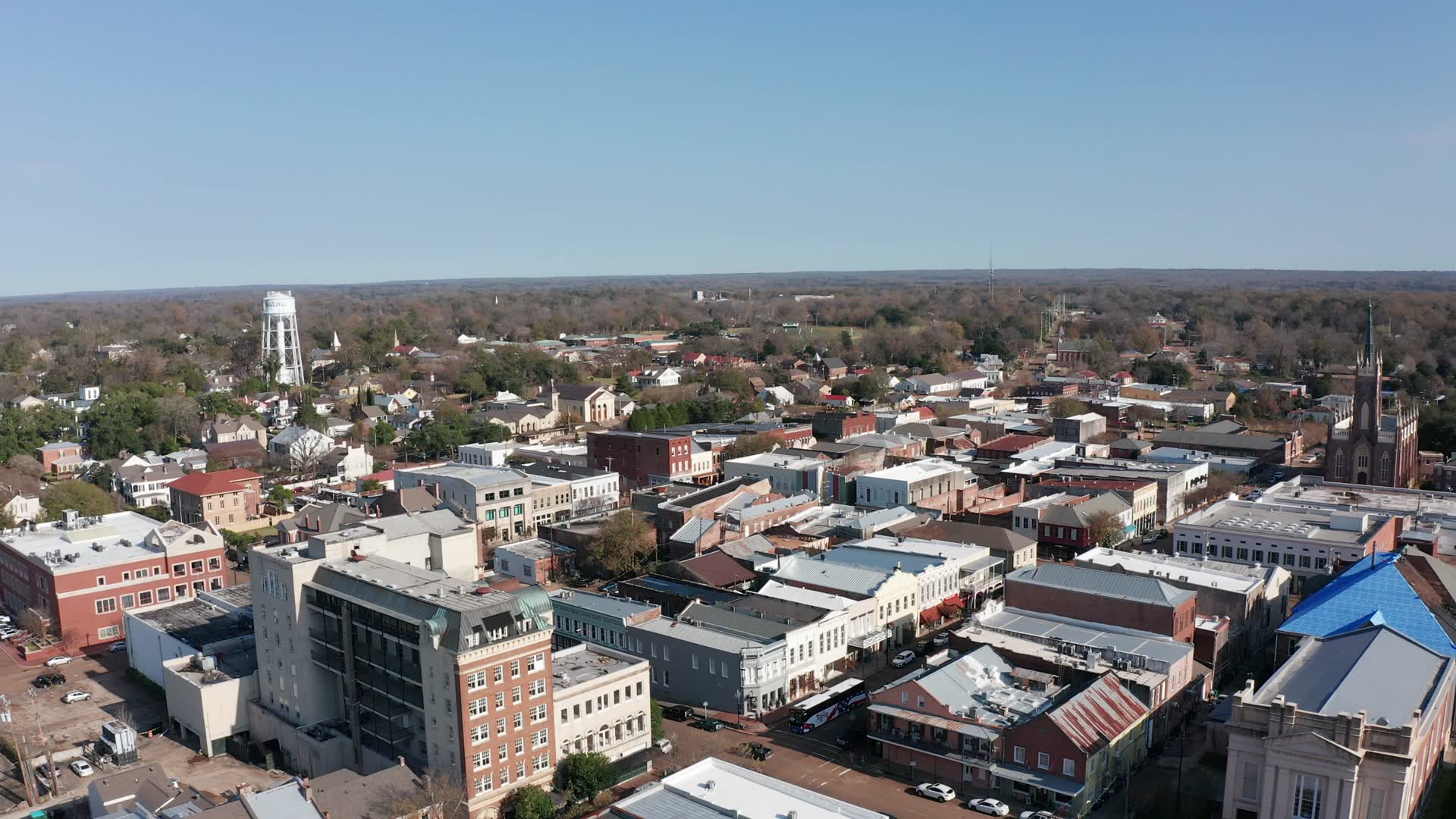
What is Our Worst Societal Problem?
by Peter Rinaldi
People will have different views on this. Some will say crime, racism, poverty, immorality, the Russians, Democrats, Republicans, government corruption, etc. But to me, the worst problem we face as both residents of the Natchez area and as Americans is ignorance. I noticed a pronounced change in our society in the 1980’s.
Whereas, post war, our communities had been built on hard work, acquiring education and skills, by the 80’s, large numbers of people were middle class or better and the U.S. had the richest poor people in the world. I saw a change in people. They thought they could acquire the good life without work, sacrifice or knowledge.
A lot of parents lost the drive to push their kids toward education and careers. We had lost that sense of deprivation and fear from the Depression and WW2. Life was easy. As a society, we decided that public school education need not be competent. It was no longer a priority. America was at the top. Forty years later, we have educated two generations of students who cannot read, write and compute at grade level. They don’t understand history, economics, civics and have no concept on how to handle their own money.
So the gap between rich and upper middle class and poor has grown quite wide. With the failure of parenting and many public schools, kids and young adults have become less moral, more impulsive, less able and willing to work. They can’t dress, speak, write or even do simple math. They do not behave. They drink, drug and have irresponsible sex, which creates a generation of poorly performing kids who can’t cut it, because of absent sperm donor fathers.
American society and Natchez area society have suffered greatly because of the values, morals and behavior changes. The worst thing about being lacking knowledge and being truly ignorant is that those who are so affected don’t understand they lack knowledge or skill. That’s when the blame game starts. The unskilled can only succeed materially if someone or some agency gives them something they have not earned through work. They can survive through donations from parents, family or the government. And if that support is not overly generous, then others are at fault. It’s racism, Republicans, whites, blacks, government, society’s fault.
We need reparations or extra help of some kind, because we can’t make it on our own. Of course, the answer to this problem is simple. Children must achieve the same level or a higher education and skill level as their parents. That education had to be effective and competent. The individual has to work hard, use money wisely, not act impulsively and refrain from the misuse of drugs, alcohol and sex and should not commit crimes.
The successful path is based on honesty, education and work. Yes, a few of us will succeed because we can’t inherit or marry into a comfortable station in life. But most have to succeed by work and dedication over a long time. Large numbers, very large numbers of Natchezians and Americans are on the wrong path. We’re not on the path that worked for the nation in the 1940’s-1970’s. We’re on the path of the 1980’s and forward, a journey that ends in failure. Natchez is the perfect example of this. While we have many skilled, hard working and successful people in our community, those at the bottom of society are dragging us down, down, down, overwhelming the efforts of those hard workers.
The results are catastrophic. Depopulation occurs, as smart and aspiring people leave, fewer jobs, a poorer economy is here, more crime, failing schools and failing government, and even clubs, churches and charitable groups are falling apart.
Centuries ago, when the Visigoths were at the gates of Rome, the barbarians asked for a huge ransom in gold and silver. Otherwise, they would burn and sack the city. The Roman army and government had failed to protect the largest and wealthiest city in the world. With the barbarians at the gate, the citizens of the city, so used to the government taking care of them, demonstrated and rioted not because they wanted security and protection from the invaders, but because they wanted free bread. The rich people fled with their money and possessions. The ransom was not paid. The barbarians entered the city, burning about a third of it and killing 70,000 men, women and children. Several attacks later, Rome actually fell and its nation in the West was destroyed. But the barbarians only pushed over what had become a very weak civilization, a people who could not care for themselves.
Natchez and America share some similarities with Ancient Rome. Society had reached a peak of wealth, prosperity and success but large numbers of people became unproductive and dependent. They lacked skill and would not work. They spent too much time on pleasure and excess. In my heart and in my head, I know our situation is not as deep and dark as Rome. Salvation and remedy are possible. But I often question whether success will return. Like you, I think. I hope. I’m fearful but not certain of the outcome.

Blind and Dumb or Complicit?
by Peter Rinaldi
Garbage trucks a threat to safety
Blind and dumb or complicit? American Insurance of Natchez confirms that one of their insured’s vehicles was hit and damaged by a Metro-United Infrastructure garbage truck here in Adams County.
After claiming it was insured, the company admitted it is not, a violation of state law. Adams County supervisors have known for some time that the garbage contractor was running uninsured trucks here and that those trucks were not compliant with DOT regulations either.
The county’s contract with the garbage hauler specifies it must carry the proper insurance both for vehicles and general liability. Since supervisors willingly allowed United to operate outside the law, there is the question whether county leaders negligence could lead to a suit against the county and the individual supervisors themselves, as they and taxpayers could be held liable for any serious injuries and damages resulting from an accident with the uninsured trucks.
Supervisors have purposely allowed United to ignore and violate state laws and failed to enforce provisions of the contract that would protect the public from grievous harm. By Mississippi law, supervisors themselves are generally protected from lawsuits for their governmental actions. But that protection ceases if supervisors are negligent and willingly complicit in illegal activity.
Supervisors Middleton and Wilson have stated they want to cancel United Infrastructure’s garbage collection contract for poor service.
But Supervisors Gaines, Hutchins and Gray have stuck with the company. Now we have learned that the trio knew the company had no vehicle insurance and that United’s trucks did not meet DOT’s safety and inspection regulations. Ouch!
Clearly, both United and supervisors are working together to violate the law, expose the county to legal jeopardy and put our citizens at risk. What’s wrong with these supervisors? What the heck are they thinking?

History of Adams County
with Peter Rinaldi
Bordering the Mississippi River in the southwestern part of the state, Adams County, the first county organized in the Mississippi Territory, has played a crucial role for three centuries. From its importance in Native American history and its role as Fort Rosalie in the colonial period to its prominence as a center of Mississippi economic and political life in the early 1800s, from Natchez as an urban center in the middle of cotton wealth to cultural tourism in the mid-twentieth century and a major civil rights boycott in the 1960s, the region has been central to Mississippi’s history and identity.An ancient home of mound-building people, the area that became Adams County was by the early 1700s home to a confederation of Indian groups that included the Natchez.
Beginning in 1716, when French colonists established the Natchez District and built Fort Rosalie as a central governmental and military post, the Natchez and French came into contact and then conflict. French leaders first brought African slaves to the area in the 1720s. French economic interests included trading with the Natchez for deerskins and trying to grow tobacco, both for sale to European markets. In 1729 the Natchez attacked Fort Rosalie, killing more than 200 of the fort’s 750 residents and undermining some of the French interest in the area. War between the French (and their Choctaw allies) and the Natchez from 1729 to 1733 led to the enslaving of a number of the Natchez. Beginning in the 1730s, the Natchez began to break up into different groups, with some of them leaving the area and some forming alliances with the English.The successive European claims to the Mississippi River Valley meant that Natchez had multiple influences and complex demography from early in its history. The French and Africans and various Native American groups had a presence in the county in the 1730s, followed by English and then Spanish colonists. The Spanish period from the 1760s to the 1790s left a major mark on Adams County.
Spanish governor Manuel Gayoso de Lemos had authority in Natchez territory from 1789 to 1798, when the region came under US control. Gayoso encouraged agricultural experimentation, planned a set of avenues for the city of Natchez, and welcomed many of the groups that gave Natchez its distinctive character.Cotton, slavery, and trade on the Mississippi River revolutionized life in the early national period. Tobacco and especially cattle were key to the area’s economy in the late 1700s, and population increased dramatically after farmers in the Natchez area first grew cotton successfully in the 1790s. Natchez developed one of Mississippi’s first slave markets at the Forks of the Road, and it often held several hundred slaves at a time.In the late colonial and early national periods,
Natchez was Mississippi’s center for government, education, science, and religion, as well as for slave trading and the wealth generated by plantation agriculture and commerce. Founded in 1799 in the Mississippi Territory, Adams County was named for the nation’s second president. From the first territorial census in 1792 through 1840, Adams County had the highest population in Mississippi, with slaves accounting for between 42 and 52 percent of residents. As a meeting place, Adams County became crucial to movement on the Mississippi River and as the end point of the Natchez Trace. The area called Natchez Under-the-Hill became a temporary home for many steamboat workers, travelers, and gamblers.The Natchez District was home to Mississippi’s first territorial government, and many the members of Mississippi’s political elite resided in the area. George Poindexter moved to Adams County in 1802 and became territorial attorney general in 1803, representative to the General Assembly in 1806, and the state’s second governor in 1820. William Bayard Shields arrived in Adams County in 1803 and served in a series of positions dealing with land, banking, and the law, becoming the state’s first chief justice in 1817.
Conflict between Natchez elites and other Mississippi voters and political voices began in the 1790s and continued through the movement of the capital to Jackson in 1820.With the French and then the Spanish presence, Natchez in the 1700s was the home of Mississippi’s first small group of Catholic settlers. All of the Protestant groups that ultimately grew to dominate much of Mississippi church life set up establishments in early Adams County. Baptists came to the area in 1799, and Tobias Gibson formed the first Methodist church in Washington in 1799. In 1807 James Smylie helped start the first Presbyterian group in Mississippi outside Washington. In addition, Jewish services were held in Natchez beginning around 1800.
From 1800 to 1820 Adams County’s population grew from 4,660 to 12,076, with its slave population far outnumbering whites or free blacks. In 1820 the county’s population consisted of 4,005 whites, 118 free blacks, and 7,953 slaves. With the growing cosmopolitan center of Natchez and the remarkably profitable large cotton plantations surrounding it, Adams County possessed a unique combination of urbanity and large-scale plantation slavery. For example, Adams County had far more people employed in manufacturing and commerce than any other county, and most of Mississippi’s planters who owned more than 250 slaves lived in Natchez. Adams County was one of the nation’s wealthiest areas and various commercial enterprises were established as a result. Publisher Andrew Marschalk, sometimes called the Father of Mississippi Journalism, started several newspapers in the area, including the Mississippi Gazette, which he founded in Natchez in 1802. The state’s first bank, the Bank of Mississippi, opened in Natchez in 1809, and Mississippi’s first academy, the Ker School, opened in Natchez in 1801. The territory’s first college, Jefferson College, opened in Washington in 1802, and Elizabeth Female Academy opened there in 1818.Architecture marked and continues to distinguish Natchez. The combination of wealth, ambition, cosmopolitan tastes, and skilled craftspeople shows in numerous homes built in the early and mid-1800s, many of them large brick buildings with distinctive names. The styles shifted from Federal to Greek Revival to Italianate, often with unique artistic touches.In the 1830s and 1840s Adams County’s importance within the state had begun to wane a bit, but it remained the county with the most residents, including the most slaves.
In 1840 the county had 4,910 free whites, 283 free blacks, and 14,241 slaves. The most famous free African American in the county was William Johnson, known as the Barber of Natchez, who owned multiple businesses and left a diary detailing life in the city. Adams County trailed only Warren County in number of commercial and manufacturing workers in the state. A sprawling sawmill operation owned by Andrew Brown was one of the largest businesses in Mississippi, which helped rank Adams County among the leaders in the lumber industry.On the eve of the Civil War, Adams County remained home to both slave plantations and city dwellers, but while many areas of the state had seen dramatic population growth, Adams County stagnated in the prewar years. With 5,648 free whites, 225 free blacks (by far the state’s largest such population), and 14,292 slaves in 1860, the population had hardly changed since 1840. What had been the richest place in Mississippi, with the biggest houses, the wealthiest people, and the most productive cotton plantations (with the highest numbers of slaves), now ranked in the middle of the state’s counties in the value and productivity of farm property—seventh in cotton production, thirtieth in corn production, and twenty-seventh in value of livestock. Fourteen counties had larger populations.With a population of 6,612, Natchez nevertheless remained Mississippi’s largest city in 1860. Whereas foreign-born immigrants were rare in most of Mississippi, Natchez had 767 foreign-born men and 475 women, the state’s largest immigrant population. Many of the foreign-born were Irish workers.Adams County stood as a striking exception to the Methodist and Baptist domination of the state’s religion. In 1860 census takers counted just six churches in Adams—two Presbyterian churches, one Episcopal, one Baptist, one Methodist, and one Catholic. However, these churches were larger than most of the state’s other congregations.
Among the many notable individuals in antebellum Natchez were Varina Howell, who married Jefferson Davis in 1845 and eventually became the only First Lady of the Confederate States of America, and Elizabeth Taylor Greenfield, who was born a slave and became a popular opera singer in both the United States and England. Natchez native John F. H. Claiborne was a political figure and newspaperman who became an important postbellum historian of Mississippi.After the Civil War and emancipation, Adams County retained a large African American majority. The county was briefly a center for African American politics, with Natchez minister and educator Hiram Rhoades Revels serving briefly as Mississippi’s first African American senator in 1870–71. Revels later became the first president of Alcorn College. John Roy Lynch, who like Revels arrived in Natchez during the Civil War, became the Speaker of the Mississippi House of Representatives and then a member of the US Congress from 1873 to 1877.
Although Adams County had many of the largest plantations in the antebellum period, its farming people worked on some of the smallest farms in the state after the war. Only four counties had average farm sizes smaller than Adams County’s 104 acres. The transformation of large plantations into small farms was accompanied by a dramatic increase in sharecropping. About two-thirds of the county’s farmers—the highest percentage in the state in 1880—worked for shares.Postbellum Adams County nevertheless remained one of the state’s leading centers for manufacturing and a destination for immigrant workers. In 1880 Adams County manufacturers employed 417 workers, the second-highest number in the state, and the county’s 619 foreign-born men and women (most of them from Ireland, Germany, England, and Italy) gave it the state’s largest nonnative population.
By 1900 the average farm size in Adams County had dropped to fifty-five acres, as the increasing use of sharecropping and especially tenancy divided land into even smaller units. The county’s population of 30,111 included more than 24,000 African Americans, and only 6 percent of the African Americans who farmed were landowners. Natchez remained one of the state’s larger cities, and Adams County continued to have substantial numbers of foreign-born residents (443) and industrial workers (811).In the early twentieth century Adams County in many ways remained unique by Mississippi standards, and religion was one of the clearest manifestations of that uniqueness. In 1916 Adams ranked very low in the number of Southern Baptists (420) but third in the number of Episcopalians (463) and fourth in the number of Catholics (2,533). African Americans comprised the majority of Adams’s churchgoers. The largest group in the county was the National Baptist Convention (3,800 members), while the African Methodist Episcopal Church had a sizable membership.
Early twentieth-century Adams County was home to a number of notable and creative individuals. Residing in Natchez were editor and Prohibition leader Harriet B. Kells, prolific adventure novelist Prentiss Ingraham, and writer Alice Walworth Graham, who set some of her romance novels on the area’s plantations.Two of Mississippi’s most important efforts to preserve particular visions of the state’s history started in Natchez.
In the 1930s Natchez women led by Katherine Grafton Miller began marketing their city as a destination for tourists who wanted to experience antebellum homes and their history. In the same decade Roane Byrnes Fleming began work that eventually led to the creation of the Natchez Trace Parkway, offering both natural beauty and historic travel.At the time of the Great Depression, Adams County retained a largely agricultural economy, but 12,608 of its 23,564 residents lived in Natchez, making it one of only three Mississippi counties in which a majority of the population lived in urban areas.
African Americans made up about two-thirds of the county’s population, while the remainder featured greater ethnic diversity than existed in much of the rest of Mississippi, with a substantial number of immigrants, especially from Italy. Businesses in Adams County employed about 800 industrial workers, many of them in sawmills and a creamery. Tenants operated 80 percent of the county’s farms, which concentrated on growing cotton.
By 1960 Adams County’s population had grown to 37,730, with whites achieving a slim majority (50.5 percent) for the first time as a consequence of African American out-migration as well as an increase in the white population. Agricultural labor had declined to one of the lowest percentages in the state, and a majority of workers were employed in manufacturing. Over the next two decades, Adams County experienced an 82 percent increase in manufacturing jobs, and it ranked seventh in the state in per capita income and second in retail sales. Adams was home to Armstrong Tire and Rubber, one of the larger factories that moved to Mississippi as part of the Balance Agriculture with Industry plan. The county also had the highest value of mineral production in the state, mostly petroleum from its thirty-four proven oil wells.
In the 1950s and 1960s Adams County played a significant role in both civil rights activism and opposition to civil rights. The county’s chapter of the National Association for the Advancement of Colored People (NAACP) demanded desegregated schools immediately after the 1954 Brown v. Board of Education decision. Ten years later, shortly after local NAACP president George Metcalfe attended a Natchez school board meeting to ask for the desegregation of schools, he was injured by a car bomb, and activists in several groups, including the Student Nonviolent Coordinating Committee (SNCC), responded with a long boycott of white-owned stores. The Americans for the Preservation of the White Race formed in 1963 in a gas station outside Natchez, and the city’s Ku Klux Klan was among the strongest and most active in the state, with members responsible for several murders, including that of Wharlest Jackson, a black man whose truck was bombed after he was promoted over two white men at a factory in 1967.
Because of the constant threat of violence, black men in Natchez welcomed a chapter of the Deacons of Defense and Justice, a militant organization that pledged to protect the black community by using violence if necessary. SNCC, the Congress of Racial Equality, and the Mississippi Freedom Democratic Party did not attempt mass mobilization in Natchez until they had undertaken efforts in the rest of the state.Like many of the state’s Mississippi River counties,
Adams County’s 2010 population had decreased by about 15 percent over the previous half century, reaching 32,297, most of them African Americans. The county also featured a small but significant Latino minority, about 6.5 percent of the population. With historical attractions, pilgrimage tours, museums, and festivals, Adams County is one of Mississippi’s leaders in the arts and cultural tourism.

Facts from Concordia Schools
by Peter Rinaldi
Many locals believe Vidalia kids should not be transferred to Ferriday schools, and that it is counter productive to send kids from middling performing schools to lower performing schools. Louisiana modified its A-B-C-D-F grading system a few years ago to include more specific scoring. The Louisiana Believes School Performance Score, SPS, is compiled from LEAP tests, growth, dropout rates, graduation rates, ACT scores, skills tests, interests and opportunities and other factors. Scores range from 60-150, the state average being 80.2.
Academic Watch 60.0-74.9
One Star 60.0-79.9
Two Stars 80.0-99.9
Three Stars 100-119.9
Four Stars 120.0-139.9
Five Stars 140.0-150.0
Ferriday High 66.9--C
Ferriday Junior High 49.2--F
Ferriday Lower Elementary 58.2--D
Ferriday Upper Elementary 56.1--D
Monterey 100.2--A
Vidalia High 81.4--B
Vidalia Junior High 68.1--C
Vidalia Lower Elementary 74.2--C
Vidalia Upper Elementary 74.2--C
Monterey is holding up the entire district, Ferriday schools are in crisis and Vidalia Grades 3-8 are showing signs of deterioration compared to years ago. Vidalia schools all rank above Ferriday schools. We not consider the Concordia schools good until 50 percent of students perform at or above grade level (mastery and advanced).
If some folks want to be satisfied with mediocre or poor results, that's their choice. This has nothing to do with race. It's all about performance and skill. We should not accept the propaganda that coming from the district office that things are moving along nicely.
Unfortunately, it appears both the Sentinel and Democrat routinely spread this bull to make people feel good and to curry favor with their news sources. A great disservice. All you need to do is check the state's website to see if the district's claims are true. Often they are not or twisted to serve the propagandists' needs. It appears the state says Monterey and Vidalia High are good schools.
And the rest are not so good and need much improvement. The kids are not getting what they deserve. Reform is necessary.

Vidalia, Ferriday and Natchez Schools
by Peter Rinaldi
I still haven’t figured out why a parent who values a good education for his or her child would ever send that child to a school graded by the state as a C, D or F school, where the school ranks in the bottom 50 percent of schools in the state.
If I couldn’t afford a private school or get my kid in Delta Charter or move to Monterey, I would get a second job, ask relatives for a stipend or move to where schools are acknowledged as good. I wouldn’t send my kids to Natchez public schools either, other than Natchez Early College. I don’t understand this complacency to accept what both states say is a substandard education compared to other communities.
I can understand why Vidalia parents would not want to send their kids to Ferriday High, because it does not rank as highly as Vidalia. But I don’t understand why a lot of Ferriday parents won’t enroll their kids in Delta Charter as an academic step up from Ferriday. Why not send your kid to a better school for FREE?
The school board has its back against the wall for several reasons. The district and a series of superintendents delayed desegregation for many years. As a matter of fact, the district spent thousands of dollars and hundreds of hours of effort trying to destroy Delta Charter before it got started, wasting resources that should have been spent elsewhere, like on a viable desegregation plan.
So now, the game is over. The feds are tired of waiting. And Toya and the school board are willing to use some Vidalia kids as sacrificial lambs to cover their own failures.
Toya said when she got her salary renewal at above $120,000 a year and a three-year contract extension, that she had a continuing commitment to excellence. The board make like her. She may be competent. But there is not excellence in the system at this point, as so few kids score at “advanced” or “mastery” within all schools except Monterey.
I would invite parents to read the specifics on their school that are available for both Concordia and Adams schools on the state department of education websites. If you have trouble discerning the complexity and all the details, let me know and I will send you a summary for your school.
Frankly, I don’t think excuses cut it. The two systems, Concordia and Adams together, are spending more than $135 million each year to educate 5000 students. The results for the money spent are terrible, and the states have pointed out the weaknesses.
We’re not going to ever have successful communities economically, unless this lackluster performance is fixed. And pushing a few kids from Vidalia to Ferriday in a racial juggling act just makes things worse.
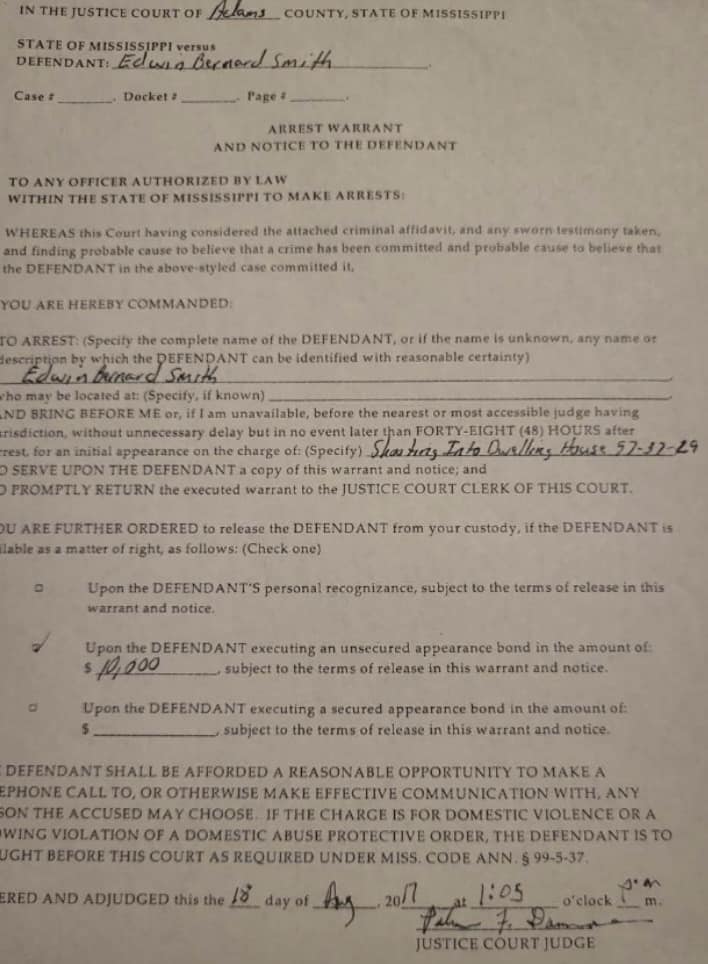
Mystery at Adams County Justice Court
by Peter Rinaldi
When Judge Audrey Minor retired, she said it was for health reasons. But in fact, she retired because she was about to be kicked out of her job by the Mississippi Commission on Judicial Performance for serious wrongdoing.
Testimony by a former justice court judge, a justice court clerk and several other Adams County residents indicated that Minor was violating the law in the way she handled cases. The allegations were serious, provable, but the Ethics Commission decided not to publicly release the facts from its investigation and scheduled closed door hearing.
Minor resigned but not before her own chief clerk filed suit against her and the county for wrongfully disciplining the clerk. Minor had convinced supervisors that her clerk was doing a bad job, when, in fact, the clerk knew Minor was misbehaving. Eventually, supervisors realized that it was Minor in the wrong but not before the judge resigned and retired.
Minor's difficulties began a long time ago when she was assistant justice court clerk, serving under Clerk Betty Stiles, Judges Patricia Dunmore and Charlie Vess. County Administrator Cathy Walker told Supervisors Lazarus, Watts, Felter, Campbell and Grennell that a few hundred dollars was missing from the justice court till. Minor made repayment of approximately $100. A follow up audit revealed no additional monies missing. Despite the missing money and repayment, no disciplinary action was taken, as Campbell and Grennell felt Minor should be given any benefit of doubt.
In 2017, Minor was still jusice court clerk and Judge Patricia Dunmore issued a warrant for the arrest of Minor's son, Edwin B. Smith Jr. Smith had apparently shot at a man at the victim's home on Saragossa Rd. At least four shots were fired, so Dunmore issued a warrant for Smith's arrest for shooting into an occupied dwelling.
Normal procedure would call for the warrant to be given to the justice court clerk and the clerk to give the warrant to the sheriff's office. But Smith was never arrested. Whether Minor as justice court clerk unlawfully held the warrant or the deputies got the warrant and failed to carry out the arrest is uncertain. Dunmore is deceased. Retired Judge Charlie Vess said he didn't know about the case until I mentioned it. I've sent two requests with questions to Sheriff Patten about the warrant. He has not replied as yet. At this point, the statute of limitations on the alleged crime has passed, so no legal action can be taken. I did a quick check Smith's subsequent record. I see no other criminal acts.
Minor's son, Edwin Smith, was eventually hired by our county supervisors to serve as their IT director from approximately 2020-2022. The shooting was not disclosed prior to his hiring. Some of the supervisors knew Smith and Minor were son and mother. Some did not. Justice court clerks allege that that while Smith was county IT director, he would work late at night in justice court and that computer files were moved, so that now Justice Court Judge Minor could attend to cases in which the plaintiffs or defendants were friends. The cases were allegedly moved from Judge Eileen Maher to Judge Minor. This is an allegation not proved. Since the clerks' evidence and Judge Maher's evidence has not been released by the state, we're left in the dark as to specifics and proof. But Adams County supervisors are aware of these allegations. I would like to know which cases were moved and when and by whom, for sure. I believe this information was submitted to the state prior to Minor;s hearing.
It is surprising to me that Supervisors Gaines, Gray and Hutchins, who initially and adamantly criticized their current justice court clerk and so sided with the now disgraced Judge Minor, that they have not issued a public apology or statement on this mess. I'm going to ask Supervisors Middleton and Wilson what they think of this mystery and wrongdoing. I am already aware that they did not know of Smith being Minor's son, nor did they know of the shooting before Smith was hired as IT director.
As a postscript, I have also talked in detail to the victim of the shooting and gotten all the details as to what happened on the day of the shooting. His information is truthful and supported by the arrest warrant. Also, if Sheriff Patten replies to my queries, I will let you know. It would paint a more complete picture if we knew if the wrrant was delivered to SO or not.
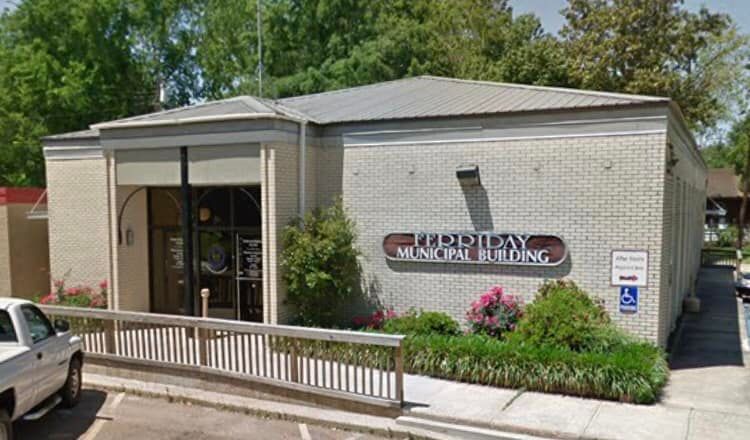
Ferriday Mismanagement Continues
by Peter Rinaldi
Just before Thanksgiving, the Legislative Auditor released the 2022 CPA report and audit. Yes, 2022. Tte town should have also issued its 2023 report by now. But its management by both former Mayor Rydell Turner and the council were inadequate, with the leaders routinely violating state law.
Negative findings from the audit said: The Town could not supply the auditor documentation related to franchise tax receivables, contracts for services, grant agreements, fixed asset purchases including bid process, invoices or similar documentation on expenditures, retirement plan submissions, rental income, accounts payable, pledged assets, and grant tracking. The Town had an unfavorable expenditure variance of $412,950 or 14.5% for the year ended June 30, 2022.
The Town operated without a budget for eight months of the fiscal year. Minutes of several council meeting from July 1, 2021, through June 30, 2022 could not be produced. The Town did not remit Safe Drinking Water fee payments to the state since 2017.
The Town did not remit the funds due to the various judicial and law enforcement agencies for the charges/tickets paid during the year. The Town did not timely file their financial statements with the Legislative Auditor on a timely basis.
The Town's bank account that holds utility deposits is less than the schedule of utility customer deposits. The Town could not supply documentation on grants received and tracking of expenditures and grant restrictions.
The Town could not supply documentation that it complied with Louisiana Bid Law in the purchasing of several assets during the fiscal year. The Town is not depositing the correct amount of funds in the required bank accounts to meet bond requirements. The Town's bank account that holds utility deposits is less than the schedule of utility customer deposits.
The town council has proposed three tax issues for Dec 7, because the town cannot pay its bills.
Ferriday is close to insolvency. And the only option leadership has is to cut expenses by $500,000, eliminating the police department and turning over enforcement duties to the sheriff's office for a fee of $450,000 annually. The own must increase its water and sewer rates to cover a $215,000 annual loss. The town only has $149,000 in cash available for unrestricted use, which is much too little to operate and pay bills timely. Even if the voters pass all three punitive tax measures, the town is going to run out of money before the new revenues are collected and benefits from bond refinancing take effect.

Fighting Crime in Natchez
by Peter Rinaldi
Social problems lead to crime.
I was asked today what can be done in Natchez -Adams to cure its violent crime problem. Of course, we’re a lot more dangerous than most towns across the USA. And while crime is not a Black problem because about 25-30 percent of our felony offenders are White, the majority of our local violent offenders are Black.
So why is that?
1. Criminals, regardless of race, do not hold high religious values or believe in exhibiting good morals. They believe in doing what they want, when they want and don’t figure they’ll get caught if punished. No matter whether you’re rich or poor, college educated or illiterate, from a great family or a rotten one, if you carry God or profound humanistic and socially conscious values with you, you’re probably not going to become a gangster. Nothing like the 10 Commandments. Still a good guide to a wonderful life.
2. Natchez public schools provide a substandard education with only 25-35 percent of students able to perform at or above grade level. When kids get a lousy education and/or the kids and parents do not see the value in getting an excellent education, then over time, hundreds and eventually thousands of kids are not skilled and not able to compete successfully in job markets. They make poor employees and earn less. They are more likely to commit crime as they are growing up.
3. Many women, including the far majority of Black women in our community, have their babies without marriage, out of wedlock. The last time I looked, about 72 percent of local Black women were single when their babies were born. And the percentage of White females doing the same is rising, about 36 percent. Regardless of a woman’s race, if she goes through sex partners and there is no father figure helping to raise male children, there is often trouble ahead.
You can look up the national stats yourself. The children of unwed moms are more likely to be poorly educated, not as likely to be successful career-wise and more likely to commit crime and end up in jail than those that come from two parent, male and female, married families.
4. The Democratic welfare state has substituted subsidy for self-reliance. As long as you remain single and poor, the government will subsidize your poverty with all kinds of programs and benefits. Meant to help those on the bottom of the economic ladder, the beneficiaries will lose most or all of their benefits if their incomes increase with two working parents. These subsidies work against raising children properly because the subsidies are small. The subsidies guarantee poverty. But there are way too many families in our county on partial to significant government help, which damages the woman’s career, skill and earning abilities. So, there you have it. To fight the crime wave, you have to believe in God and act like you do; get a solid education for career building and get married before having kids.
To add a postscript, let me be absolutely clear. If 72 percent of White, Asian, Hispanic or Martian women popped so many babies out of wedlock, didn’t get married first before having kids, their kids got a stinking education, and they didn’t follow God’s word, they’d be in the same mess and committing crimes like crazy.
But in the past two generations in Natchez Adams, most of our White, Hispanic and Asian kids come from married parents (at least initially), got a decent or good education at AC, Trinity or Cathedral, religious and moral behavior were part of school training as well as at home, and the kids were raised by married parents.
Of course, many single moms, regardless of race, are excellent parents, raise their kids properly without government assistance and have high moral and religious values. But it’s not their kids causing the stink and the trouble.
Those are the main problems that contribute to crime here and in many crime ridden towns across the country. How can this be corrected when people persist in making bad or poor choices?
I started seeing this big time back in 2010. So I wrote about it and how it was affecting us in Natchez. The changes were a slap in the face, a sign of self destruction. It seems like the changes have become even more etched in our local society since 2010. And so we will continue to fail, if these conditions are not remedied.
There are a few positive signs. Local Black illegitimacy declined from 80 percent to 72 percent in recent years. Natchez High started a small but successful Early College program with Co-Lin that’s outstanding. I’m not sure how we’re doing with morals and obeying God. I see the ways locals behave on FB with swearing and threats and the plethora of misdemeanor and felony crimes committed in town and I would conclude morals are not so hot.
But I do remember growing up in the 1960’s and coming to Natchez in the late 1970’s. Crime was much less. People behaved better. A higher standard of excellence and morals were promoted by families, schools, businesses and society generally.
I’m hoping for a change but not expecting one.
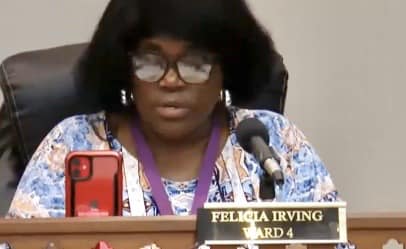
Felicia says No! No! No!
by Peter Rinaldi
Felicia Irving
Mississippi has tightened its rules on conflicts of interest. The Attorney General and the Ethics Commission has advised the Natchez aldermen and Adams supervisors they should not sit in on meetings where they could personally benefit or their relatives could benefit from the discussions.
So Supervisor Kevin Wilson leaves the meeting room when discussions of his planned oil disposal site occur. Alderwoman Felicia Irving has a relative in the fire department. So she cannot vote on fire department policy or fire budget issues. But she refuses to leave the room as suggested by the AG and the Ethics Commission.
She says she’s not trying to gain advantage for herself or her family but simply represent her ward at the meetings. Her refusal is expected to bring a complaint to and investigation by the state. If the state decides to sanction her, she can be fined or suspended from office. If she refuses to comply a second time, she can be removed from office.
Irving said at the aldermen’s meeting that she will not comply.

Tony the Tiger
by Peter Rinaldi
Tony Heidelberg, Shameca Collins, Danny Barber
County Prosecutor Tony Heidelberg is in a tough situation. He’s supposed to get appropriate and sometimes high or no bonds on serious violent and repeat offenders. Heidelberg’s job includes recommending to the Justice Court Judge the appropriate or no bond for the arrested criminal at the preliminary hearing. Tony is smart and able. He knows the ropes. And he has served as both prosecutor and defense attorney. So he understands the mechanics and what needs to be done.
But if he allows Justice Court Judge Shameca Collins to operate like she did as District Attorney, then the revolving door of felony offenders committing crime after crime will return. He can’t control Shameca. But he can influence her and place before the court incontrovertible evidence that the accused felon is very dangerous to society or maybe not as dangerous as some.
When county supervisors appointed Collins, they poked a finger in the eye of voters, saying “We don’t care if you want law and order, we want Shameca because she’s a political insider, one of us! If you don’t like our crime, move to Vidalia.” Supervisors ignored voters. The voters said she was lousy at her job and overwhelmingly chose Tim Cotton as DA because Collins was such a failure.
Meanwhile, citizens are content that Judge Danny Barber continues to place appropriate bonds on those arrested, whether they are white, black, rich, poor. He looks at the accused felon’s history. Has the accused been arrested and convicted before? Is he a flight risk? Is he liable to commit another crime? Is he a threat to the community? Barber’s recent return to the bench has helped Adams County. His bonding practices have been right on the mark.
But what will Tony as Prosecutor do? Will he just flow along with the normal Collins behavior? Or will he stand up for law and order and use his office to protect our citizens? Inquiring minds want to know.
City of Natchez 2023 Audit Highlights Accounting Problems
by Peter Rinaldi

The City of Natchez released its 2023 Silas Simmons audit, with city officials and subsequently, The Democrat, saying the city received a "clean" audit. This was a false statement, as the CPAs noted problems in bookkeeping and accounting for which the mayor, aldermen, city clerk and staff are responsible. The six major problems and findings are quoted verbatim from the audit report.
Problem 1: Some City bank accounts are not being properly reconciled to the general ledger accurately or in a timely manner. This internal control deficiency is causing the City's general ledger balances to be incorrect throughout the year. When accounts are not reconciled, it increases the likelihood that a misstatement will occur and not be prevented, or detected and corrected, on a timely basis. Timely reconciliation of bank accounts to the general ledger is a key component of any adequate system of internal control. Reconciliations should be prepared to ensure that (1) all cash receipts, disbursements, and transfers are recorded; (2) checks are clearing the bank in a reasonable time; (3) reconciling items are appropriate and are being recorded; and (4) the reconciled cash balance agrees to the general ledger cash balance.
Problem 2: In some instances, transactions are not being recorded to the City's general ledger in a timely manner. In some instances, transactions recording and other accounting errors are not identified in a timely manner. Transactions should be recorded to the City's general ledger at the time of initiation. General ledger account balances and general ledger transaction detail should be reviewed on a timely and ongoing basis.
Problem 3: A subsidiary record of all interfund transfers, interfund loans, and interfund advances not maintained by the City's accounting department. An accurate schedule of all of interfund activity that reconciles to the general ledger is necessary for City management and the Board of Aldermen to know the financial resources available for each fund.
Problem 4: During the process of obtaining an understanding of internal control in planning the audit, assessing control risk, and assessing fraud risk, a lack of segregation of duties was noted. Specifically, it was noted that the City Clerk was responsible for initiating, recording, authorizing, and reconciling cash transactions pertaining to the fiscal year. Segregation of duties is a key component of any internal control environment, with the primary objective being the prevention of fraud and errors. The objective is achieved through the separation of the functional responsibilities of a financial transaction among different individuals. Ideally, no single individual should be able to initiate, record, authorize, and reconcile any one transaction.
Problem 5: The City's Single Audit was not filed with the Federal Audit Clearinghouse by June 30, 2024. Criteria In general, 0MB Circular A-133 requires any nonfederal entity that expends $750,000 or more in federal awards in a fiscal year to have a Single Audit. The Single Audit must be completed and submitted to the Federal Audit Clearinghouse within nine months of the end of the entity's fiscal year. In addition to the Single Audit requirement, 0MB Circular A-133 requires an audit of the entity's financial statements for the same fiscal year as the Single Audit.
Problem 6: We noted instances of adjusting journal entries recorded in the City's accounting records that lacked an adequate description and proper documentation. Further, the City does not have a formal set of policies and procedures in place to track and account for adjusting journal entries. Criteria Adjusting journal entries are prepared for transactions that have not been recorded in the accounting records through another process or to correctly restate an account balance or previously recorded transaction. Policies and procedures specific to adjusting journal entries are necessary to ensure that any journal entries posted to the City's general ledger are properly prepared, documented, reviewed, approved, and recorded.
Editor's note: The city says it will fix these problems, which occur year after year, every year since the current administration took office. The city says its 'turnover in accounting staff, limited accounting staff, and accounting staff with limited training and experience resulted in these problems,' and the City Clerk will prevent these problems from occurring in the future.
The Baby Boomers
by Peter Rinaldi
El Salvador, Natchez and Crime
by Peter Rinaldi
Positive Economic News for Natchez-Adams County
by Peter Rinaldi
District Attorney Tim Cotton
by Peter Rinaldi

Local Tax Policy
by Peter Rinaldi
Industry and families look at property tax rates when locating in a community. The lower the millage rate the better. But the method of determining assessed value is equally important. Alabama has the second lowest property taxes in the nation which has contributed to a boom in development.
What are relocating businesses and families looking for? 1) An already growing job market 2) Access to good, new housing, both for rental and purchase. 3) A skilled or semi skilled workforce large enough to support new industry and new commercial ventures. 4) access to highways and railroads. 5) Good public schools. 6) Good community cultural activities and recreation. 7) Access to medical care including specialists. 8 Low crime. 9) Favorable government including good services (police, fire, streets, utilities.) and 10) modest taxes.
Look at the prevailing millage rates. These millage rates do not include city taxes. Lincoln 108 mills, Copiah 112 mills, Warren 117 mills, Adams 126 mills, Pike 136 mills.
Adams and Pike counties have already priced themselves out of the market. And when you add in the other aforementioned factors, it makes Adams disadvantaged. Only in category 6, in recreation and cultural activities, does Adams outshine its immediate and nearby competitors.
Adams is not just in competition with Southwest Miss. but the entire South, including NC, FL, AL. Even in our own state, places like DeSoto, Rankin, Madison, Lafayette and our Gulf Coast counties are growing quickly, while we have lost more than 20 percent of our jobs and people in recent years.
People get so frustrated with agencies like Natchez Inc., because honestly, it’s not possible for it to bring an economic revival because of all the factors necessary to recruit new jobs. So Natchez Inc. lies about its success or lack of to keep political support and funding. When a community like Adams has higher taxes, it guarantees that those looking for new locations will take a more in depth look at other communities. A higher millage rate combined with the current punitive reassessment program absolutely guarantees that those within your community with good resources will look elsewhere for a better quality of life as well as a lower tax bite.
About 30 percent of Adams County residents are below the poverty line. Higher millage and assessments impact the poor even more greatly, increasing their housing and vehicle costs. Current Adams County tax policy, which includes the city tax structure on top of the county millage, is truly detrimental to living with some level of economic security for poor folks. Half of our households earn less than $37,000 a year. That’s rough. Hard to raise a family of two, three or four on less than $37,000.
Combined with a job market than pays less than the going rate compared to other parts of the South, you can see why the outflow of residents, including those with the lowest incomes, has been so pronounced since the 1980’s. By itself, restructuring tax policy will not turn a declining community into a growing one. However, punitive taxes always make things worse not better. Reassessment and millage increases have pushed the Adams County budgets, including city, county and schools beyond $170 million, up 50 percent in five years. This increase in revenue includes huge federal and state COVID subsidies that will be disappearing. Then what will local governments do? Tax citizens even more?

Natchez History and Tourism
by Peter Rinaldi
My first experience studying Mississippi goes back to 1972-1973, when I was in college in Maine and studied black history in Mississippi during the Civil War and Reconstruction extended into the Jim Crow era 1861-1890. I had never lived south of Connecticut when I actually moved to Natchez in 1978. What surprised me when I got here is that tourism was so successful based on an anti-historical and romanticized view of the era of the planter society pre-Civil War.
The hoopla and hoopskirts, Confederate uniforms and fancy Pilgrimage dresses seemed to satisfy the tourists. By the mid-1990s, it was obvious that tourists’ desires were changing. The bus tours had fallen away due to overregulation and competition from other Southern markets. There was a need to deal with that change, which included a realistic view of the history itself. That was not provided. It was still hoopskirts, Confederate uniforms and pageants forever! So the pageants began to fail, Fall Pilgrimage started falling apart and even Spring Pilgrimage declined.
It wasn’t until the 2000’s that Natchez decided it might throw in some black history, and that was done haphazardly, without much money and done by people who actually had practically no knowledge of our black history. But of course, while history can be separated into segments for study, such as planter society or slavery history by itself, it actually occurs in one big jumble all together at once and the different segments are interdependent and interrelated.
There are three major occurrences in travel in the 1990’s and 2000’s that affected Natchez that did not bring rewards. First, Americans got incredibly wealthy as a society, which meant there was much more travel with that growth in income. Second, Natchez replaced its outmoded and antiquated hotel facilities with new, modern hotels that were equal to competitor cities. And third, many of the old homes changed ownership. Rich outsiders came in, spent millions and millions on redoing their homes and gardens. Those properties are now in the best state they’ve ever been in. But still the tourism isn’t what it used to be. Why is that? I would suggest that Natchez had been slow to tell its real historical story to travelers, which should include the heyday of planter society, slavery, the Civil War, Reconstruction, Jim Crow era and even the civil rights struggle of the 1960’s.
People and tourists want the real deal, real history. And the historical experience should also be interactive. While much of the U.S. has developed interactive historical experiences, Natchez generally has not. There is good reason why our cemetery tour with locals acting as the costumed persons buried there is so successful and yet guided tours of fancy houses are actually seeing fewer and fewer numbers.
Also, we have segregated the history experience. White folks generally run the whitey Pilgrimage and black folks generally run the black history offerings, with the real history often lost. That’s one thing the Natchez National Park does not do. And it’s one reason why the Park is the number one draw in town. But as you know, the locals and the National Park don’t really work together. It’s almost as if they are in separate worlds.
As witness to our current predicament, we’ve had no visitors or welcome center operating for nearly a year. The new Depot Center is open just six days a week and there is practically no signage or online presence to announce its operation. The garden clubs, their tour agencies and Visit Natchez do not coordinate their message or activity. And the new emphasis on black history is done in such amateurish fashion to be inconsequential. And the National Park Service continues to operate in its own universe. While the fixes to these problems can be debated, the problems at the very least, are more than obvious. As a minor suggestion, I would venture that the Natchez visitor experience should be based on actual history versus fantasy and that the historical experience must be interactive not just passive.

Truth Lounge Debacle
Truth Lounge
by Peter Rinaldi
The Natchez Planning Commission will discuss Truth Lounge at its meeting this week in light of a shooting that occurred at a nearby parking lot during bar hours. The Franklin at South MLK area has become a hang out spot since the lounge opened. More than a dozen shots were fired and one person wounded recently. Law enforcement has ignored loitering, drug use, illegal drinking, trespassing, illegal parking, noise violations , blocking roadways, and the area has turned into a late night festival for weekend bad behavior.
The city had generally taken a hands off policy since the bar owners filed suit against public officials. The Planning Commission can put restrictions on the bar’s operations and the aldermen can review, adopt or reject the Commission’s rulings.
During the Grennell and Gibson administrations, the mayor and aldermen haven’t done that much about fighting the violent crime wave other than change police chiefs four times in eight years. General policy has been the same at Truth Lounge as in other parts of the city: Whatever happens, just happens.
Some city residents claim that the black-owned bar with mostly black patrons has been singled out for unfair and racist treatment. But actually, the incidence of stabbings and shootings in Natchez-Adams County bars have occurred in bars that have a majority black customer base.
Both Sheriff Patten and Police Chief Green have previously expressed their concerns about law breaking and violence at and near Truth. The sheriff and chief are both black and unlikely to discriminate against black entrepreneurs and their customers. But both their departments have scaled back their enforcement near the bar following the filing of lawsuits.
When Judge Debra Blackwell was asked to intervene to protect public safety, she declined to do so, instead allowing the city and bar owners to work out any solution they saw fit.
As a result of the passive attitude toward safety, crowd misbehavior has made it difficult for businesses near Truth to operate safely. And a number of residents noticed bullet holes in their vehicles and bricks or woodwork struck by bullets after the last violent outbreak.
While many defenders of Truth say the owners are not responsible for how people misbehave outside the bar itself, there were very few incidents of law breaking in the last decade on upper Franklin and MLK toward the fire station, that is, until the bar opened and the big crowds arrived.

Prosecutorial and Judicial Improvement
by Peter Rinaldi
There’s been a dramatic change for the good since Tim Cotton has come on as DA and Danny Barber has returned as Justice Court Judge. Tim is spearheading the indictments of scores of serious felony criminals who have been in jail or out on bond. Nearly 200 have been indicted this year so far.
Most of these guys are repeat offenders, many charged with shootings, killings and sex crimes. The volume of work coming from the DA’s office has been magnificent, especially in comparison to his lousy predecessor. Over the course of the next year, I expect many of these indictments to be resolved in trials and convictions.
As Justice Court Judge, Danny oversees the setting of bond for felony offenders, binding them over to the grand jury to see if the offenders should be indicted. Danny had been setting appropriate bonds and no bonds for some, based on community threat, flight risk and the arrest and conviction history of the accused. The laxity of his predecessor is history. Danny is responding to the threats caused by repeat felony offenders.
Both men deserve credit for this dramatic shift in performance from their offices. As a result, we’re safer. The news is good.

Adams County Audit Hits Circuit Clerk and Tax Collector
by Peter Rinaldi
Bridgers CPAs of Vicksburg was not able to finish the Adams County 2022 audit on time, being more than six months late, because the county did not collect its data and pass it to the CPAs in a timely fashion. Findings included as follows:
1. The county did not always follow state purchasing rules. The county paid a few invoices without the proper documentation. In response to the error, supervisors appointed a new purchasing clerk.
2. Purchases from the road department were authorized by persons other than the road manager. The county says it will correct this problem.
3. Bank reconciliations were out of balance by small amounts. Circuit Clerk Eva Givens had assigned a lower level clerk to handle this, and that clerk was unable to figure out why there were discrepancies. Additionally, the fee account was not reconciled for an entire month.
4. Circuit Clerk Givens did not deposit excess funds into the county's general fund on a timely basis. Givens failed to make her annual financial report on time. Once filed, she also claimed an expense of $16,805 that was not allowable. Unfortunately, it was a lower level clerk that made the reporting error. Additionally, there were math errors in computing retirement contributions. The CPAs said Givens should re-file the report with the appropriate corrections. Givens did not respond to the problems herself. But the unnamed clerk said she would correct the errors. The CPAs pointed out that these statute responsibilities belong to Givens herself as the elected official.
5. Tax Collector Terrence Bailey showed an overage of $526,000. The Tax Collector kept his own manual accounting system on spreadsheets, instead of using the Delta software used by county offices for many years. He did not know how to use the software, despite being in office for four years. As a result, it was not possible for the CPAs to verify his accounting procedures and tallies as necessarily accurate. The Tax Collector's Office has repeatedly not performed bank reconciliations since 2018. The audit showed he did not compare reconciled cash with booked cash. And the amounts were different. Additionally, the lack of accurate bookkeeping made it uncertain as to whether Adams County, the City of Natchez and Natchez-Adams School District got the proper amounts due. The CPAs concluded the lack of controls over cash could result in the loss or misappropriation of funds. The CPAs did not feel confident that the stated cash figures from Bailey's office were accurate or could be substantiated, so they left those figures out of their report. Bailey responded saying he has passed on all collections to the various entities required, including state and local. He arranged for Delta consultants to come and teach him about the software in Fall 2023. Whether that training was successful is unknown. And whether he has corrected the glaring bookkeeping and cash control problems is unknown.

Natchez Mall and Local Retail
by Peter Rinaldi
While quite a few folks expressed concern on my FB pages about the mall’s idea to convert the interior of the mall to a storage facility, such a sale of the property and conversion is unlikely and would be very expensive. Natchez being such a mini market, the need for such large storage is questionable. It is more likely that the mall will remain as is, with a few stores operating that have their own individual outside entrances. Tabani had been more fortunate than some malls. It has been able to lease some space, whereas many malls have closed completely.
The retail prospects of Natchez have declined precipitously in the past generation, as we’ve lost 25 percent of our population and approximately 30 percent of our residents are living below the poverty line. The possibilities for growth of retail products and services for middle and upper income consumers here are very slim. Most entrepreneurs and chain operations want to locate in communities that are growing quickly not declining. And the near “destruction” of the mall, Tracetown and Magnolia Mall are signs that the retail market is declining. Fortunately, there are a few companies, like dollar stores, that like poor communities, since poor customers are their target consumers.
Downtown has again become more important, as several dozen local entrepreneurs have opened in the last three years. Most will blow away in the normal 3-5 year business cycle, but quite a few of their buildings have been rehabbed and will find new business tenants when the first crop plays out.

A Year Remembered
by Peter Rinaldi
Natchez-Adams County occasionally places criminal penalties of time to be served or fines to be paid for commission of misdemeanors.
But very often, cases are dismissed, remanded to the files or suspended sentences awarded. Sometimes a small fine is assessed, but with it comes some sort of deal. The penalties actually earned are watered down. A pat on the fanny and let go. Shoplifting, drug possession, theft, simple assault. Misdemeanor offenders are filling city and justice court, with many of the same faces seen year in, year out.
Worse, felonies are often plead down to misdemeanors. Crimes that should bring 3-10 years in jail are given the magic eraser, plead down to suspended sentences and small fines. The plea downs include serious violent offenses, sex crimes, shootings.
If you ask why crime is bad, it’s because prosecutors and judges are played by defense attorneys. The judges and prosecutors are weak and ineffectual and perfectly willing to see crime committed at its current pace. A high rate of crime proves they are necessary and important and deserve the high and outlandish pay they make.
As to defense attorneys, there are many who will sacrifice their integrity for a buck. They will most assuredly lie to the court about their client’s behavior, even if the perp is a killer. No one forces the defense attorney to lie and scheme for money. He does so willingly and is rewarded by the system for doing so.
If you ask me who is causing the biggest problems, I’m not sure it’s the criminals. When judges and prosecutors handle 500 cases and make sweetheart deals on more than half their cases, who is making sure that we have repeat crime? If you don’t prosecute, convict and sentence appropriately misdemeanor offenders, you get more misdemeanors and more felonies. A sorry and incapable justice system that uses the magic eraser on felonies will most assuredly get more thugs running rampant around town. More violence and more property crimes are guaranteed.
Nothing says incompetence like letting shooters bond out on very low bonds who have a history of felony arrests and convictions. This is insanity. And it happens all the time in Natchez-Adams County.
Really, it’s just a few people in charge of this mess. Two justice court judges, two circuit judges, a municipal judge and prosecutors, county prosecutor, district attorney and assistant district attorneys. These officials and the defense attorneys that slug through court are going to determine how safe or unsafe Natchez-Adams County is and will be.
I wish it wasn’t this way. Watching our community slide into an abyss of crime 2010-2023 has been heartbreaking. But when incompetents are elected or appointed, this is the result. Sure as shootin’. Here’s to a 2024 that’s more resolved to convict and sentence the criminals who plague us.

Enshrined Failure
by Peter Rinaldi
In the past two years, nearly 20 states have dropped testing requirements for graduating students, including Mississippi. Why? Because the students would fail the tests if forced to take them. Mississippi has moved to a phony grading system where school districts that are failing their students can still earn a B or C. Natchez has a grade of B, but only 10-35 percent of its students are proficient in math or language arts, depending on the grade and subject.
The real purpose of our public education system and our government schools is to reward employees with good pay, benefits and retirement not educate students.
If you want a quality education in Natchez, especially if your kids are in elementary or middle school, choose ACCS or Cathedral. If your kids are smart enough to get into Natchez Early College at Co-Lin, they’ll get a good education. Otherwise, put your kids at ACCS or Cathedral. Don’t be foolish and believe the lies told by the Natchez School District as to quality. It has enshrined failure.

Treating the Mentally Ill
by Peter Rinaldi
Finding the mentally ill appropriate healthcare has always been a problem in Mississippi. Most of these patients lack good medical insurance or financial resources to pay for appropriate care. They need specialized care for their drug, alcohol and other mental illness problems. As a result, the underfunded in-patient care state system almost always has a waiting list. Chancery courts sometimes order the mentally ill to be housed temporarily or not so temporarily in jail, waiting for an opening at a state funded or private care facility.
The cost for 30 days of in patient care can run $50,000-$100,000 per patient. And the support system needed to start an-inpatient center is more than $2-4 million minimum. So it’s impossible for small counties to start a new in patient mental health care facility. The only county that could actually afford a new center would be Hinds. So we’re more or less stuck with the system we have.
The Legislature has never properly funded mental health care, either in-patient or outpatient. It never will.
And mental health is differentiated just like other healthcare. We don’t treat cancer patients the same way we treat diabetics or those with kidney failure. Likewise, the treatment for alcohol and drug addicted persons is different than those with schizophrenia or patients suffering from what we used to call a nervous breakdown. This differentiation increases costs.
Without proper funding from the state for facilities and programs, continuing inadequate private insurance coverage and the low to moderate incomes of most Mississippi families, it is a problem that simply won’t be fixed.
I am reminded of the example of a family very close to me, whose mother suffered from both alcohol and drug addiction. The hospital in-patient and outpatient treatment costs out-of-pocket to help the mom regain control of her life and restore her mental and physical health was more than $200,000.
The problems are great and the resources less so. The Legislature would need to appropriate $100 million a year to begin to tackle this problem. And insurance companies would have to pay more than 80 percent of a 30 day treatment plan less deductibles. Neither is going to occur.
So some mentally ill patients will end up in jail.

Did the Trash Contract Include Bid Rigging?
by Peter Rinaldi
Adams County supervisors wanted to award their civil engineering and trash contracts to minority contractors. Political decisions. When they did so, the cost to taxpayers rose dramatically.
It turns out that the effort by Supervisors Gaines, Hutchins and Gray to “do the good deed” and help a black contractor backfired when they chose Metro Disposal from Metairie for trash pickup, Metro did a lousy job here and in other communities they served, like Slidell and New Orleans. While other black contractors did a good job in New Orleans, Metro trucks were not maintained and broke down frequently. The company did not pick up trash as scheduled, often skipping some residences for two weeks or more. It was the same story here in Adams County.
Eventually, service in Adams completely came to an end when Metro ran out of money, and the company filed for bankruptcy. Reorganized as United Infrastructure, the former Metro owners were given a 90 day emergency Adams County contract, but this time at more than double the normal monthly price.
There was also the question of whether the bid was rigged by the three majority supervisors to give Metro the emergency contract. Supervisors could have offered a long term contract to attract many more potential bidders and to lower the price per month to households and the county. But they purposely offered a short term contract, so that Metro-United could be the winning bidder.
And of course, the company is still doing a mediocre job, not running complete routes and missing pickups.
Supervisors Middleton and Wilson have tried to point out to their fellow supervisors that the current approach to trash pickup is costing way too much, as Adams County now has the highest trash pickup rates in state plus the service issues.
Supervisors Gaines, Hutchins and Gray haven’t dealt with budgeting the extra cost either, deferring the issue to after the elections. But the extra $600,000 has to be budgeted and paid. Trash bills to homeowners should have been more than doubled by now. But no change in billing has been made because four of the five supervisors have election opponents.
Right now, the majority three seem perfectly content to allow both county and city residents and taxpayers to pay for this error. As of now, city residents are paying for their own trash pickup through their water bills. And city residents are also subsidizing their neighbors out in the county trash pickup through property taxes. Talk about unfair. And probably illegal.
In past, the state and courts have ruled that utility and trash services had to be paid by the people who actually get those services.
Please explain to me why in-city residents on Pearl or MLK Street should pay their own trash pickup and also subsidize out-in-the-county trash pickup in Cloverdale, Kingston and Cranfield.
This whole rotten mess shows how foolish the black majority supervisors are. In an effort to bend over backwards to help a minority contractor, the three supervisors are actually harming thousands of black homeowners in Adams County by providing the most expensive and lousy trash service available.
All three, Warren Gaines, Angela Hutchins and Ricky Gray, have made statements in the past about how difficult it is to be poor in Adams County. Well, the three are really putting it to those poor folks now. Big time.

Expect the Possible
by Reter Rinaldi
Natchez mayors and their citizens are always caught in the same trap: expecting a newly elected mayor to lead the community to the prosperity that never happens. What does happen is that by the end of the mayor’s term, many citizens become fed up with the lack of progress and the mayor loses support. This was undoubtedly true during the terms of Mayors West and Middleton as well as the more current Mayors Brown, Grennell and perhaps even Gibson.
Here’s what occurs. The candidate wants to be elected. So he offers hope, the promise of positive change and economic revival. When the economic revival fails to arrive, the mayor tries to convince his subjects that things are in fact moving forward economically. But citizens quickly notice the mayor’s mistakes, crookedness and lies, and sooner or later, he is overwhelmed by his errors. Revival doesn’t occur and support evaporates.
The biggest error occurs right in the beginning of the campaign, when the mayoral candidate promises to turn around the course of 40 years of history that includes the decline of the wildcat oil industry, the destruction of our manufacturing base, population outflow and a demographic shift from a majority middle class white community to a majority poor black community.
None of our mayors are God or Moses. The Israelites are not being led to a land of milk and honey.
Instead, citizens should be looking at whether the mayor does a good job running city government as an administrator. Is he wise, careful with money, hard working, honest and ethical?
Past, current and future mayors face the same core problem. Natchez does not generate enough tax revenues to meet the basic needs of the city, including police, fire, public works, streets, lights, landscaping, tourism, seniors, transportation, facilities maintenance, city employees and community development.
Unable to meet these needs, many mayors choose to borrow excessively and lie profusely to maintain their position. The result is always the same. The mayor is ejected from office and a new mayor chosen. The cycle begins anew.
Perhaps Gibson will break this trend. His supporters are counting on his political skills, hard work, energy, bull throwing, butt kissing and borrowed money for big projects to change the course of events.
To me, Gibson is the agent of change, meaning he is the mayor most likely to give us the management expertise we want to run the city bureaucracy better than it has been in the last 40 years. But I do not expect a successful economic revival led by him.
And if he and his supporters insist on such revival, he will ultimately fail and lose his seat.
What Natchez needs to stabilize and grow is a population that increases because there are more jobs paying higher wages than in past. That’s not going to happen. No mayor can make that happen. And actually, recent history of the last 10 years shows Natchez rapidly declining and the gap increasing between our low household incomes and the state average.
Through the last five mayors, we’ve declined precipitously as a community. And hopes, promises, bull throwing, schemes, scams or good projects are not going to counter the path we’re on.
So if we want to save Dan and Dan wants to save Dan, then we must adjust our unrealistic aims and concentrate on the things we can actually do with our very limited means. I’m saying we should break the cycle of failure that actually goes back to Tony Byrne’s last term, when the economy started to get shaky.
The obvious questions are, “What should we do now and in the short term to improve city management and services without breaking the bank and borrowing huge sums? How can we, through our modest means, improve government and quality of life in town for a community that is increasingly majority black, poor and lower middle class?”
We should break the cycle of disillusion and failure. We should change the way we think and the way city government is led.

Searching for the Truth
by Peter Rinaldi
Incidents of crime are normally reported to the DOJ annually on a voluntary basis. Participation in crime reporting makes it more likely a city will get crime fighting grants from the feds.
Natchez PD had been tallying the numbers on violent and property crimes since the 1990s. For whatever reasons, the city stopped submitting those statistics at the end of 2020. There is no public info available from DOJ on Natchez for 2021 and 2022. And the PD has not made public any info it might be keeping privately.
I received repeated information from inside NPD that the 2019 and 2020 statistics were adjusted to make the city look safer. However, I was unable to confirm whether the stats were lies or truthful and simply decided to use the phrase “could be incomplete, subject to confirmation.”
It’s unfortunate that the city has decided to keep citizens in the dark. I use crime mapping software to mark where felonies occur and are reported. But I don’t have access to all the info the city and county have on calls and arrests.
For 2022-2023, it appears that violent crime is increasing once again and that property crime may actually be decreasing a bit. But I’m not sure-sure and would need more police and sheriff’s data to come to a firm conclusion.
When stats aren’t readily available, it allows law enforcement and politicians to lie about what’s happening. For example, Chief Daughtry claimed he had taken 150 guns off the street. But there was no arrest record to back up that wild claim. Fantasy and baloney. Bull.
Since citizens pay for their government with taxes, they have a right to know what’s going on. Keeping accurate crime stats, participating in DOJ reporting is normal and necessary for cities of our size and larger. We should know precisely where we stand.
Of course, if crime is getting worse or much worse, then it’s in the interest of law enforcement and the politicians to hide the facts, so they can keep their cushy jobs and mislead the peons. But it’s not in the community interest to obscure or fail to disclose the truth.

Stolen Firearms and Cute Judge Tricks
by Peter Rinaldi
One of the aspects of our local crime problem is that guns are stolen from homes and vehicles during break-ins are then sold to juveniles and young adults for prices of $35-$100. Stolen guns aren’t often traceable to the offender but often traceable to the original owner of the gun, who has usually purchased the firearm legally through a store backed by paperwork.
Unless the perp leaves good fingerprints on the stolen gun and has a felony record, the stolen gun is the perfect tool to use in a crime, shooting, a drug deal, confrontation with an enemy or another break-in.
Mississippi Legislators know gun trafficking and illegal possession of guns contribute to an explosion in crime. So the law says selling or transferring a stolen gun or possessing a stolen gun can earn the perp up to five years in jail. And any crime in which a gun is used can carry a five year enhancement or five year additional penalty.
What are Natchez-Adams County judges doing? Repeatedly, they are letting those who possess stolen guns go free, no jail time, sometimes a suspended sentence, sometimes a small or moderate fine. So do the perps learn their lesson? No, what they learn is the court is weak, the judge is a fool and the felon gets away with the illegal possession. The criminal is saved from justice to commit crime at a future date.
Another cute trick pulled by a Natchez judge occurred this week. The 18-year-old before the court did indeed possess a stolen gun. Instead of finding him guilty or binding the accused over to the grand jury, the judge retired the case to the file for one year. At the end of a year, if the young man keeps his record clean, then the case will be dismissed.
This kind of judicial malfeasance if repeated many times over has the same result as a suspended sentence or small fine. It guarantees the criminal knows he has played the game and won and escaped justice.
We acknowledge that repeat felony offenders are the primary cause of the death and destruction, the violent and property crime scourge destroying Natchez-Adams County. But we also admit that our judges are contributing to the continuation of our crime wave due to light sentencing.
Those convicted of transferring or possessing stolen guns should always get jail time of up to five years as the law provides and the circumstances of the offense dictate.
Every person who is convicted of a felony gun crime has earned jail not hugs and kisses or a stern warning from the court.

Where Are We Heading?
by Peter Rinaldi
I have a great love for Natchez. But the incredible ignorance of its citizens always alarms me. The lack of good education, lack of skills and widespread drug and alcohol dependency help determine our future, and especially when you consider our lack of capital for growth and our isolated location. The growth of crime is a direct result of these negative characteristics.
We’ve spent millions extra on our local public schools, but overwhelmingly 25-50 percent of Natchez students fail to meet grade level expectations. And 21 percent of our adults have not even graduated from high schools. Household incomes are 40 percent below state averages. We are poorer now as a community than we have been since the 1960’s. And poverty and ignorance work hand in hand.
Thinking and analytical skills are not our strong suit, especially among our so called leaders. Our citizens elect officials who are incompetent and themselves poorly skilled and educated. You can’t expect dumb people to lead you out of a mess. They will only make it worse.
The school system is spinning out of control. The number of jobs has declined 15 percent in a decade. And the population continues to flow outward. As almost a symbol of these manifest problems is our warped view of politics. Right now, we have only three realistic presidential candidates. And similar to 2020, who would Natchez Adams County vote for? Biden, of course.
This love-worship of liberalism is reflected in local politics as well. The voters love big spenders and bull throwers. The politicians use reassessment of properties to move their city, county and school budgets above $130 million. Spend and take on debt. And while government gets bigger, the community gets smaller and poorer.
Despite this sad assessment, I like you, hope for and wish for great gains and achievements that are always on the horizon but never seem to arrive.
For me, my only recourse is to continue to write the local news and comment when things are going well or poorly. And when you are lied to or misled by the politicians for their own personal gain, those actions must be pointed out as well.
While I respect The Democrat’s role as cheerleader for the community and a recorder of all things good and positive, I would not ever feel comfortable in the role of a pom-pom girl. I’m a conservative social, political and economic reformer. Unfortunately, I can’t change. So I remain a pain in the butt for some. But if you read my FB and website posts, you will know more about our community even if you disagree with my conclusions.
My love and affection for Natchez-Adams County demands that I point out and analyze problems, make suggestions for improvement and be a taxpayers’ advocate.
I invite you to follow my news and writings on FB and miss-loumagazine.com. Weigh in when the mood or issue strikes you. I always welcome comments and opinions that differ from mine.
When I started this “news journey” more than 40 years ago, I expected our community to make significant progress. That has not happened. But I am unwilling to give up. As long as I can breathe and type, I must write what is both informative and entertaining for Natchez-Adams as well as Vidalia- Ferriday-Concordia. I’m stuck like hamster on its wheel. But it’s a good stuck.
Your input is always appreciated.

Natchez Taxpayer's Hero Remembered
by Peter Rinaldi
It's been a shock to many of us that Alderman Dan Dillard passed away unexpectedly this week. He was a good man.
Natchez city government is always beset by the fuzzy thinking and goofy ideas of its leaders. Several times in recent memory, city government has tried to spend its way into some utopia, like it's doing now.
For more than 16 years, Dan Dillard brought reason and common sense to the Board of Aldermen, challenging collective thought and a plethora of financial miscues. Dan routinely fought theft, misappropriation, alarming overspending and borrowing. He was often the first and the only aldermen to raise these issues. He was ultimately concerned that Natchez citizens get good government. Dan was an early advocate of rehabilitating the police department, city-led tourism, city clerk's office and for fair play and balance between city aldermen and county supervisors. He played a major role in budgeting and oversight management of many city departments.
In the many years he served, he had a couple of good mayors and some good aldermen. He also had a bunch of stinkers, low-lifes and corrupt jerks to work with, too, which made his job as a conscientious aldermen much more difficult.
I've been following the aldermen since 1978, when I moved here. I would say without hesitation that Dan was the best alderman we had. A few other notables come to mind, Al Graning, Tom Middleton, Lou Salvo Jordan, but Dan was the best of the best.
He was like the little Dutch Boy of legend, putting his finger in the dyke, saving the community and government from being awash in a flood of red ink and haplessness. You could count on Dan to be honest, work hard and follow through.
What a tremendous loss for his family and our city! I should have said this to him when he was alive. "Dan, you did a spectacular job. Thanks so much for your leadership and hard work to make Natchez the city it should be."
In recent years, he suffered a great tragedy, the loss of his good wife, Janet. He recouped from her death somewhat, and resumed a normal work schedule. But the burden, loss and grief and were ever-present. He loved her so.
I would ask you to remember Dan and Janet and their kids in your prayers, as well as their extended families. God care for Dan and Janet. We miss them both.
Dan Dillard was 67.

Three Amigos: Bias Plays Role in Waste Contract
by Peter Rinaldi
Adams County Supervisors have once again bungled their waste collection contract. Although county leaders Warren Gaines, Ricky Gray and Angela Hutchins quickly gave an OK to United Infrastructure, both Kevin Wilson and Wes Middleton objected to the high price that would saddle Adams County with the highest trash pickup rates in the state plus a guarantee of a 4.6 percent cost increase annually. That means supervisors will most likely double the trash pickup bills of residents after the election.
Gaines, Gray and Hutchins are anxious to award the final contract to United, a New Orleans area based minority contractor, that formerly went bankrupt as Metro Services. Metro failed to pickup the trash for several weeks and did a terrible job before that, as its cash flow worsened. The Three Amigos of Trash, Gaines, Gray and Hutchins, believe they will get more brownie points with the folks if they award the final contract to a black owned firm, regardless of the price or quality of service.
Wilson and Middleton both believe the price and service are most important and it doesn’t matter what ethnic group, black, white, or whatever gets the contract. Wilson and Middleton were in the Metro camp at first, because the company offered good service at a low price. But they soured on Metro when the company wouldn’t and couldn’t perform.
The Amigos did the exact same thing when they dumped Jordan, Kaiser and selected a black-owned engineering firm that charges a higher price and gives much worse service than Jordan, Kaiser.
It seems The Amigos believe many issues concerning “green” money can be solved by going “black," when the real issue is the “red” ink that the county will face as a result of their stupid decisions.
The choice should be made based on price and service. Trying to award trash or engineering services or any other contracts based on equity, reparations or race bias is ridiculous and against the interests of ALL the people of Adams County. Especially if citizens end up paying more than double the price for garbage pickup.

Solving the Crime Problem
by Peter Rinaldi
Burlington is Vermont’s largest city, with 44,700 residents. It is the home of the University of Vermont, generally high income, next to Lake Champlain, pretty and probably the most liberal town in America. Socialists are welcome here. While just 4.4 percent of its citizens are black, it is the state’s most black city.
What Burlington has in common with Natchez and other cities across the US is growing violence, shootings committed by black males. Three in the last week alone. Doing the research on recent shootings, I found a similar pattern to what has happened in Natchez. Perps who commit felonies are given suspended and light sentences, only to come back soon to shoot up the neighborhoods and wound or kill their enemies. For Burlington, this is a new circumstance, a shock to the fiber of the community.
For us old hands in Natchez, we’re used to black teens and young adults shooting the heck out of each other. So in Burlington, they’re talking about new social programs to curb black violence because they can’t blame the economy or poverty for a cause. Merchants are talking about hiring armed security. To Burlington’s credit, shooters are not given bond. But like Natchez, most folks don’t know why the violence is out of control.
Of course, Natchez’s solution to the wave of black violence is easy: no bond for felony offenders who have been convicted of felonies before; no bond ever for shooters. 5 years extra sentence for use of a firearm in a crime, as provided for by law; maximum penalty for shooters and second time felony offenders; maximum penalty for possession of a stolen weapon.
You can clean your streets and keep your community safe by putting all the thugs in jail for a long time. Or you can opt for new social programs like Burlington or say it’s just bad everywhere and put up with it like Natchez. Or you maybe accuse The Democrat of insensitive news coverage that highlights crime too much or call me a racist for pointing out the obvious truth. Whatever option you choose and no matter how you spin the facts and theories, if you don’t put the thugs in jail for a long time, they will come back to do more and worse. And of course, the criminals will destroy your community, just like they have done in little Natchez.

Natchez Renewal
by Peter Rinaldi
Part of a Natchez renewal should include a dedication to careful spending of tax dollars, proper management of city employees, a lowering of the tax burden on our generally poor population and proficient supervision of accounting and bookkeeping practices. Of course, we have seen little of the aforementioned practices in recent years. What we have witnessed is joyful and exuberant spending and excessive borrowing, surely requiring an increase in taxes now and in the future, when the grants end and the city is stuck with higher operational costs it can’t fund.
Some proof of this error-filled approach can be seen by just a casual review of the city budget, which had long remained in the $25-37 million range. Now aldermen will spend $51.2 million this year on $49.3 million in revenues. As homes and businesses have their assessed values massively increased, the city bleeds those residents and business people for more taxes. Local government ensures that families have less money to pay their monthly bills. Government does better, much better. But families and businesses are doing worse, unless they completely sell off their property assets. This is not progress.
Realistically, there has been no growth in the local economy but continued deterioration since 2016. Already the post pandemic recovery has ebbed, with a drop in the number of jobs and taxable retail sales up only 2 percent, far less than inflation.
Free for all spending will not make the city better in the long term. The mayor and aldermen have taken the posture that liberal Democratic government is just what we need, that crime and poor quality education can be ignored and that a blizzard of spending will cure most evils.
There is no escape from such philosophical foolishness, only self- destruction. Living within your means and providing sound and practical management are not just lofty ideals but extremely necessary in light of our diminishing stature in the state’s economy.

Win-Win or Lose-Lose?
by Peter Rinaldi
Natchez aldermen have discussed in private meetings their planned roles in financing the reconstruction of the Eola Hotel project. Virginia immigration attorney Robert Lubin still owns the hotel and is working with Mississippi developer Hayes Dent and Wisconsin developer Randall Roth. Who will own what portion of the stock is unclear, as is whether ownership stakes in the hotel will be sold to foreign investors. Foreigners who invest in blighted communities can get easy access to U.S. visas.
What is certain is that the city is moving forward on the idea of using TIF bonds to help the developer-owners. Additionally, the investment proposal would direct the Eola's sales and property taxes (except school taxes) toward repayment of the development bond. That means Natchez-Adams County taxpayers would subsidize both the construction and operation of the rebuilt hotel. While the total cost of renovating the hotel could be as much as $32 million, when finished, the hotel might only be worth $18 million, calling into question whether the investment could stand on its own feet without taxpayer subsidy and foreign investor dollars.
While Mayor Dan Gibson and the aldermen haven't discussed publicly the risks of another failed Eola project as a possibility, they have touted the scheme as a way to make the hotel a centerpiece for development downtown Natchez. No owner of the hotel has made money on its operation since the 1970's, and so far, no evidence has been presented that the new owners will make money either. Whether the Hotel would generate enough revenues to pay off its bond plus its operating expenses cannot be realistically determined, putting local taxpayers at some risk.
Conceivably, the primary U.S. partner-developers could make money through developer, management and consulting fees, either paid in cash or as stock options, while the foreign investors would not see a return on investment and face hefty losses, while still getting their prized U.S. visas.
Mayor Gibson has been pushing and leading the discussion about the Eola within the aldermanic meetings. Alderwoman Valencia Hall has said, the project is a "win-win" for Natchez, though she did not say specifically what she meant in this case. Neither Hall nor Gibson nor the rest of the aldermen have any experience in hotel redevelopment projects. But they all understand that even an unsuccessful project could still have re-election benefits, even if the investment is a financial catastrophe. The reopening of the hotel could be touted as a political success to voters, prettying up the Natchez skyline, even if the numbers don't work.
Aldermen voted 5-1 to begin the process of participation in the project, committing an initial $4 million. The city may also provide additional funds later on through a TIF bond.
The mayor and aldermen are not required by law to discuss real estate projects publicly and can keep their negotiations secret, until it's time to formally commit Natchez taxpayers to the financing plan. At that time, a series of public notices would be required and open meetings for public input would be held. But by that late date, the project would be a done deal and little could be added to change the course of the city's involvement or mitigate its risk.

Hosemann's War Against Adams County
by Peter Rinaldi
With redistricting led by Delbert Hosemann, Melanie Sojourner was purposely cut out of her state senate seat, put in a Democratic district she could not win.
The result means Adams County no longer has a senator or representative that actually resides in Adams. Robert Johnson actually lives in Hinds County and rarely comes to Natchez. That's why you never see or hear from him.
Not only does this make our political efforts in Jackson more difficult, I cannot understand why Mayor Dan Gibson continues to praise Hosemann publicly, telling him how wonderful Delbert is as a leader and how Natchez loves and respects him, when Delbert was obviously trying to hurt our community by destroying Melanie's district.
It's good to be courteous to any political enemy of Adams County, especially a Lt. Gov., but to publicly fawn all over him is a waste of time. He will give you only the minimum of attention, a minimum of money, because he has shown you already what he thinks of your community. You are poo-poo to him and throwing Adams into the Port Gibson based district of a Democratic senate non-entity proves that he thinks you belong in Siberia, without power, money, influence or improvement.
Delbert thinks you are nothing, worthy of nothing, so butt kissing won't do you any good. As a matter of pride and honesty, you should politely, kindly and directly tell him you know perfectly what he did to hurt us. And you don't like it or respect that behavior. And in return, you promise to be a loyal Adams County resident and Mississippian and can only support the re-election of those who actually support us, versus those who try to hurt us. The door remains open to future conversation, but the underlying principal must be that we expect state government and the Lt Gov. to help Adams County and not harm our community.
--- Note: When I posted this little commentary without the stirring headline on Del's FB page that invites public input, it was immediately deleted by his staff. Shows you, doesn't it?

Battling Crime in Natchez
by Peter Rinaldi
Why would the mayor and aldermen believe that by simply changing police chiefs violent and property crime will decrease? Unless you change the way you police and the way you manage the department, you will get the same failure over and over again. There are many towns and cities across the US that have effective policing. And a lot of communities are very safe. But Natchez is not.
We all know that the increase in crime and violent offenders is complex in nature, having to do with home life, immorality, evil, even wayward judges and prosecutors. But the job of police is simply to arrest perps. They’re not educators, social workers or ministers to the soul. Their job is simply to deter crime by having a large enough presence on the street, to use pre-emptive investigations to keep the criminals huddled down and afraid, and to arrest every felon who commits a serious crime. A big task. But some communities do this very successfully.
If your mayor and aldermen do not have a solution to the police and crime management problem, then new officials are needed. If we don’t change the current situation, Natchez will have a future but a future worse than it is now.
It’s pretty obvious that gangs, drugs, violent and property crime are out of control in Natchez and law enforcement and the politicians are unable or unwilling to deter this crime. Is it time for armed citizens to patrol their own neighborhoods? I think so. To be effective, neighborhoods would have to form their own security districts, equip and pay armed security, an expensive proposition. But if law enforcement won’t do the job, you have only two choices: armed protection or surrender to the criminals.

The Change
by Peter Rinaldi
In 2022, I noticed a significant change in the direction of the Natchez-Adams County School Board and its management. In past, the district tried to highlight its successes, while acknowledging its need to do better, especially in things like test scores and the state’s evaluation. This past year, school leaders changed direction and overblew modest improvements post Covid, trumpeting somewhat dishonest A/B/C evaluations and ignoring that only 15-35 percent of students performed at or above grade level in various subjects such as math, language arts and reading.
This change marks a reinforcement of the earlier dishonest policy when the district built a new high school when voters specifically told the bosses they didn’t want one. There remains a strong constituency within Natchez-Adams County for the repair and upgrade of our local schools, including improving the quality of teaching and student performance.
It’s strange that our nearby school districts in Catahoula and Wilkinson are engaged in lengthy discussions on how to improve their schools, discussions that include board members, administrators and the public. Weaknesses are openly discussed and hotly debated. Those districts, with far less money and resources than Natchez Adams, are dealing with these problems. They’re not lying to the public.
While Natchez-Adams supervisors and aldermen dropped the issue of an elected school board because of Philip West’s opposition, it’s now pretty obvious that he is the obstruction to change and should be removed and a new honest superintendent chosen.
In the end, the lack of positive outcomes for learning in the Natchez public schools harms the students and impairs the economic future of the community. The schools are a reflection of the community they serve. And the downhill slide of both over the last 30 years is obvious to all except the blind and corrupt insiders.
You cannot reverse outward migration of the population and a decrease in economic activity by continued poor schools, lots of crime, low-paying jobs, dilapidated housing and inferior community aesthetics. However, lying, misleading the public and failing to follow public mandates only make a bad situation much worse.
It’s sad that some black political leaders say they want our black schools to do better. But their actions reveal the truth. They want the power and money for themselves and their friends and the black kids can go to hell, if changes threaten who is at the top.
These leaders are not the champions for racial justice but the purveyors of racial injustice. So the rich and upper middle class black kids and white kids and their parents flee the Natchez public schools for AC or Cathedral or play ‘the where does the parent/kid live? game,’ and try to slip the child into the Vidalia or Franklin County schools. The failure of Natchez public schools will drive a parent manic and/or broke to save his or her kid.
Like all of us, I have more questions than answers, and solutions are easier to spout than actually enact. But I know the schools will never, ever get anywhere and succeed with dishonest leadership in charge. They will always fail and miserably so. That is inevitable.

Short Story: A Kiss from 1992
by Peter Rinaldi
My wife and I decided to give a New Year's Eve party back in 1992, when we lived in Village Green in Natchez.
I've never liked parties much. And whether I'm the host or a guest, I get so nervous, I can't enjoy myself. But we lived in the Village Green neighborhood for more than a decade by then, so I succumbed to my wife's request-command that we sponsor a drop-in party from 6-9 p.m. and invited neighbors and their kids and told them to bring a dish or snack or whatever.
We still had the Christmas tree up, of course. I went to Piggly Wiggly and loaded up on snacks, cheese, sandwich meats, cookies, beer and Dr. Pepper and Coke. I called Domino's and asked them to deliver four cheese pizzas at 6:30 p.m., figuring people would be just a bit late in arriving. And I stopped at the liquor store to pick up two one-gallon bottles of Gallo wine. As my wife stated and against my better judgment, it's Natchez, and alcohol is a mandatory party favor.
The party went well. Lots of families came. I had a roaring fire in the fireplace. It got so hot inside the house, I had to turn on the a/c. The kids were having fun. My older son sat at the kitchen table enjoying a card game of Uno with his friends. My younger son and his friend playfully argued over a Chinese checkers game in front of the fireplace. More kids were in the TV room in the back playing the video game Tetris. The adults were milling around, drinking very little but eating a lot and talking a lot. I had a Dave Brubeck jazz cassette playing softly on the stereo. Perfect. My anxiety lessened. About 8 p.m., I noticed our neighbors Pam and Frank sitting on the couch together. They were both in their mid 70's, and many years before, they had been married to each other and had kids, though they had been divorced at least 20 years by 1992. They still lived in the area. Pam lived on Sun Court and had remarried a guy who was a semi-professional gambler, which meant they were always broke. Frank had moved over to North Temple and married fishing. No spouse. Just he, the dog and fishing.
I heard parts of their conversation that New Year's Eve. Pam was doing most of the talking and Frank was mostly listening. Pam was talking about her cake business, who she was making cakes for, what kind of cakes, the kind of icing and the decorations she put on the cakes. Back in those days, she was known for her made-from-scratch cakes. She had a little bakery in the Morgantown Plaza for a few years, where UMB is now, When they tore down the shopping center and built the bank, she moved her cake business to the house and never missed a lick, if you'll pardon the joke.
Pam was in the middle of her cake dissertation to Frank, when Frank gently reached for her hand and leaned over to Pam and kissed her on the lips, passionately and romantically. Pam started kissing him back enthusiastically. Then they hugged and kissed just a bit more. Frank then stopped and just held her hand. And I could tell she was getting emotional, and she started tearing up. They didn't talk. They just sat there on the couch, and Frank held her hand.
No one noticed the couple kissing, other than my wife and me. All the adults and kids at the party were talking, eating and playing and didn't notice the couple at all.
The party broke up about an hour later. People had a good time and everyone wished each other Happy New Year and went home. Pam and Frank went their separate ways to their respective homes.
After the party, I asked my wife what she thought. "Do you think they still love each other?" I asked. "I don't know," my wife replied and added, "It was a beautiful kiss, a beautiful moment."
Many New Year's Eves have come and gone since 1992. As the years went by, I never heard of Pam and Frank reconnecting. Pam stayed married to the gambler and Frank stayed married to fishing. Sadly, they have both passed on. Pam's husband did eventually gave up gambling. Pam did cakes until her early 90's, And Frank actually died of a heart attack while fishing at Lake St. John. A good way to go.
I think about Pam and Frank often. I think of that party, how nervous I was in advance of the party, and how they were so affectionate with each other. Almost every New Year's Eve, the memories return. I can remember their conversation, how they looked on the couch. It seems like just a few years ago not three decades.
There were two things I learned from that New Year's Eve party in 1992. First, Domino's cheese pizza is always popular and appreciated at a party. And second, no matter how old you are, you need love, caring and emotion in your life. The touch of a hand and a kiss can be so very important.

Top Stories of 2022
by Peter Rinaldi
Crime: Violent and property crimes continue to plague Natchez-Adams County; Concordia Sheriff's Office arrests several dozen cyber perps and sex offenders; Ferriday rebuilds police department with Chief Sam King; Natchez hires Commander Cal Green as its police chief; Vidalia daycare workers get long terms in jail for child abuse; Adams prosecutors and judges criticized for plea bargains, low bonds and light sentences Economic development: Miss-Lou employment rebounds from pandemic lows; Syrah Technologies announces major expansion; Vidalia pays utility customers 50% rebate, pays off entire city debt; Jordan Carriers to build new HQ; Magnolia Bluffs Casino and The Markets get new owners; Residents still moving away to get better jobs, population drops since 2020; Eola Hotel rehab project stalls Infrastructure and facilities: Adams supervisors and Natchez aldermen borrow more than $12 million to fix roads; Morgantown Road repair funded though not started; Adams supervisors-sheriff struggle over jail plans without resolution; Natchez aldermen repair parks and will update convention center, auditorium; Natchez-Adams County to issue bonds for major recreation improvements; Ridgecrest ties into Ferriday water system; Natchez-Adams politicians drop the ball on E911 relocation Culture: Balloon festival one of the more successful in its history; Natchez becomes solid new venue for live concerts; Natchez aldermen will spend $1 million on Civil War troops statue Top 2 Stories: Jessica Aldridge finally gets sentenced to 20 years for shooting and killing boyfriend Joey Cupit; Accused killer Semaj Jackson indicted for shooting Jamesia Brown and Cameron Jones

Short Story: The Christmas Mailbox
by Peter Rinaldi
Mabel and Howard Smith of Franklin County gave birth to a healthy baby boy on Christmas Eve, 1951. They named their only child, Howard Jr., but everyone in the family called him “Beau.” He was simply one of the prettiest, cutest babies anybody ever saw. The Smiths live just off Hwy. 33, down one of those dirt roads in a little white frame house. Howard worked cutting timber and Mabel stayed home taking care of little Beau.
As Beau grew, he became an avid reader. He would look at the picture books and pronounce words, asking for his mother’s approval each time he got a word right. His mother would smile and say, “You’re my smart boy!” And Beau would beam with pride. His dad would spend evenings reading the newspaper to his son, telling him truths about the world, why it’s important to be hard-working and to be good to your neighbors.
When Beau was just shy of his sixth birthday, he said, “Momma, I want to send a letter to Santa and put it at the mailbox.” So Beau and his Mom sat down at the kitchen table and wrote a short letter. The boy asked for a baseball glove for himself, a work shirt for his dad, and a sweater for his mom. Mabel put the letter in a white envelope and wrote on the front, “To Santa – North Pole.”
Beau and his Mom walked out to the roadside and the pipe iron mailbox to send off the letter. The boy cried, “Momma, Santa won’t see it in the mailbox. Put it on the outside between the box and the red flag.” So Mabel did as her son requested, and they walked back to the house, talking about what they could do to surprise Dad on Christmas. Mabel shared the story of the ‘letter to Santa’ with the aunts, uncles, and cousins at the Christmas dinner table.
When Beau was almost 19, he and his mom sat at the kitchen table and remembered the time when they wrote the letter and placed it on the side of the mailbox instead of in it. They both laughed. But it was a somber Christmas that year for the Smiths, as Beau had just enlisted and was scheduled to enter the army the first week in January. “It’s my duty. Whether I end up in Vietnam or not, I’ve got to do what’s right,” Beau said quietly. He could have gone to college, gotten a deferment, but chose to serve his country instead. And both his parents were worried.
It was early in September 1971; a rocket attack hit just north of Saigon. Beau was sitting on the edge of his jeep, talking with a buddy. In a second, it was over. Beau was killed. There wasn’t much to send home to bury, according to his platoon sergeant.
After Beau’s death, the family never seemed right again. Howard Sr. began drinking and was injured on the job. Mabel suffered from a deep depression over the loss of her son and her husband’s problems. Eventually, the couple moved away from Franklin County and the little frame house fell into disrepair. No one ever lived there again. The dad died of a heart attack in Dallas in 1980. Mabel died in nursing home in 1992.
If you ride down Hwy. 33 and look off that dirt road where the Smiths lived, you’ll still see the mailbox standing. The house is pretty much gone. But that old rusty mailbox is still there. And every year on Christmas Eve, you can see a fresh, white envelope stuck between the red flag and the mailbox itself. Neighbors aren’t sure who tucks the envelope there, but figure it could be a relative or someone close to the family who knows the story.
If you happen to see that person this Christmas Eve, please stop and thank him for remembering the Smith Family and Beau, even though so many years have gone by. The family has passed on, but there are still more than a few folks around who remember them, the good times they had, and the love they shared.
This short story originally appeared in Miss-Lou Magazine in 1996.

Tracetown Shopping Center Has Seen Better Days
by Peter Rinaldi
The decline of Tracetown is not a new thing.
When I moved our Miss-Lou Magazine offices there in 1995, the center was already in decline, as Sears had closed and about 20% of the shops were vacant. When I moved out in 2017, there were about a half dozen tenants and today maybe three or four.
With its Winn Dixie and Sears anchors gone and excessive vacancies, the center was hugely unprofitable, with insurance, minimal maintenance and property taxes much greater than annual revenues. There was little hope of a turn around.
Tracetown also suffers from antiquated construction design, a rolling hills parking lot and would require at least $3 million for the parking lot, lighting, a/c and roof repairs. So nothing will be done to change this. Realistically, the center has practically no market value, other than for its few rentals. Post office, rehab, nail salon...maybe $200,000-300,000 in value tops, less considering the maintenance and operational problems.
Add to that, flat and leaking roofs and overhangs, antiquated ac systems and the general decline in the Natchez economy, the center just hemorrhaged money. Many of the units are so severely damaged because of the catastrophic roof leaks. The Mobile, AL owners had also sold off their frontage lots to the bank, McDonald's and Ruby Tuesday's to get some operating cash. But selling off the front doomed the Sears property. The former Sears location had no parking left. And the building itself was in such poor shape, no smart tenant would rent it. the owners then tore down the Sears building, After thieves stole all the copper and wiring out of the theater, that building was demolished, too.
The Lazarus Arts-Dr. Kumi complex is separately owned and not part of Tracetown.
The owners gave away their shopping center in Ferriday to the town to get rid of that property and operational costs. And I expect, sooner or later, the owners will approach Natchez about the same kind of deal, like the Fry Building. Politicians would tell you what a great deal it is to get a donated center or building. What they don't tell you is that the donation takes the property off the tax rolls, relieves the owner of the high maintenance costs, transfers those to taxpayers and nets the politicians some tidy campaign donations during the next election cycle.

Good Garden Clubs
by Peter Rinaldi
One of the puzzling things about our community is how the Pilgrimage Garden Club, Natchez Garden Club and Auburn Garden Club get a bad rap on occasion.
Most of the members of these clubs are very interested in the economic vitality of Natchez Adams. They understand that history preserved can mean more tourist dollars, more conventions, more hotel stays, more restaurant visits and more jobs. Well maintained historic properties not only bring tourists but have brought a new generation of well to do out-of-towners who have spent millions of dollars upgrading their antebellum and Victorian homes. And that investment has paid off in many jobs for people of all economic groups and all races.
There was a time in Natchez, when some connected to the clubs used their platform to try to cement their social position above others, but the time of the so called landed gentry is long gone. I’ve often heard how the garden clubs killed off IP and Armstrong. In fact, the those closures had nothing to do with the clubs. The factories were losing so much money and had serious union problems that meant making a profit unlikely. So the factories closed and the jobs were lost. And many garden club members mourned that economic downturn like the rest of us.
Remember that some of the old homes are not owned by garden club members. Some are also owned by men. And many of the new generation of old home owners continue to run their properties at an economic loss and do so because they have the extra money to do so and/or are committed to a better Natchez even if it costs them mega cash. Whether you’re a garden club member from downtown, Morgantown or Kingston, all share the same goal: a better city and county with more prosperity for all. Also, you’d might be surprised to know that many garden club members are actually very middle class and some less so. But regardless of wealth, the members share an interest in exterior and interior design, flowers, gardens, architecture, history and historic preservation.
We should be proud of their contributions to our community. Some also own businesses that have little to do with history. But they understand that successful maintenance of homes and gardens and the marketing of that history and beauty to the outside world is a necessary and important task, even more so because of the decline of our industrial base over the last 35 years.
Thank you, ladies of the Pilgrimage Garden Club, the Natchez Garden Club and the Auburn Garden Club. When you think of the garden clubs, think of the economic contributions of their members which is so vital to our present and future.

Mayor Fibs About 2021 Audit
by Peter Rinaldi
Natchez Mayor Dan Gibson recently said the city CPA audit for 2021 showed much improvement for 2021 compared to 2020. He did not tell the truth, as the CPA's negative findings for 2021 continue to show that the city was not following acceptable accounting and bookkeeping practices. Of course, the failure to follow such good standards led to the theft of $36,000+ in funds by two city clerks. 2021 was the Gibson administration's first full year in office. You can't blame former Mayor Grennell for these errors. The responsibility lies with the city clerk and staff, the current mayor and aldermen. They are supposed to follow accepted accounting and bookkeeping principles and regulations. They did not.
Of the 2021 City of Natchez audit, CPA Silas Simmons said: Bank Reconciliations: Bank Reconciliations were not being properly reconciled to the general ledger or in a timely manner. Accounting Records and Financial Statement: Preparation transactions were not being recorded to the city's general ledger in a timely manner. Interfund Transfers: Due To/From, and Advances lnterfund transactions were not being recorded timely or accurately. Segregation of Duties: During the process of obtaining an understanding of internal control in planning the audit, assessing control risk, and assessing fraud risk, a lack of segregation of duties was noted. Documentation of Adjusting Journal Entries: Adjusting journal entries posted to the general ledger lacked proper and adequate documentation. Single Audit The City's Single Audit was not filed with the Federal Audit Clearinghouse in a timely manner. CPA Silas Simmons then when into detailed analysis and recommendations as to how these re-occurring problems from both 2020 and 2021 should be remedied.
Several pages of details on what to do were enumerated. If you doubt the truth as presented by both the CPA or myself, you can read the audit findings and make your own judgment. I am used to politicians lying and bull throwing. From a news point of view, I should try to verify the mayor's future claims on all subjects, as those assertions may or may not be truthful. https://www.natchez.ms.us/DocumentCenter/View/1246/2021-Audites
See pages 85-92.

Stinking City 2020 Audit
by Peter Rinaldi
When completed, the City of Natchez 2020 audit showed that the city did not meet its legal obligation to provide sound and professional accounting of revenues earned and expenditures made. The audit findings reflect the gross incompetence of the city clerk's office under Servia Fortenberry and the lack of care Mayor Grennell and the aldermen showed for their legal responsibilities. That lack of care and oversight allowed Fortenberry and another clerk to steal more than $36,000 in funds during the Gibson administration, according to the state indictment of two clerks. Aldermen discussed this lack of competence during both the Grennell and Gibson administrations but took no action to remedy the illegalities.
Gibson says the 2021 audit is much better and should be posted online soon. I will report on the 2021 audit as soon as its posted. The 2020 audit reflects activity during the Grennell administration through July 2020 and the Gibson administration from July-September 2020. While the onus falls on Fortenberry, Grennell and the aldermen mostly, the audit did not show any improvements made during the first three months of the Gibson administration.
2020 Financial Statement Submission to State Auditor: The City's audited financials were not submitted to the Mississippi State Auditor's office by the statutory date required. Bank Reconciliations: Bank reconciliations were not being properly reconciled to the general ledger or in a timely manner. Accounting Records and Financial Statement Preparation: Transactions were not being recorded to the City's general ledger in a timely manner. Interfund Transfers, Due To/From, and Advances: Interfund transactions were not being recorded timely or accurately. Segregation of Duties: During the process of obtaining an understanding of internal control in planning the audit, assessing control risk, and assessing fraud risk, a lack of segregation of duties was noted. General Fund Expenditures Over Budget: The City's General Fund expenditures exceeded its budgeted amount by $1,015,773. Casino Annual Lease Fund Expenditures Over Budget: The City's Casino Annual Lease Fund expenditures exceeded its budgeted amount by $350,490. Compliance with Reporting Requirements of OMB - Single Audit: The City's Single Audit was not filed with the Federal Audit Clearinghouse in a timely manner.

Ferriday's Big, Bad Mess
by Peter Rinaldi
Town of Ferriday finances have been in a mess for years, mostly because the town's tax base is not adequate to meet the obligations of minimal government. Additionally, town management, through several mayors and clerks, has not done a very good job of bookkeeping and accounting, with many deficiencies and adverse findings. The town was again late submitting its records to its CPA to publish an annual audit for 2021.
Some of the more recent problems include: 1) Old past due and non-collectible water accounts were still on the books. 2) Financial statements were not submitted to the state on time. 3) Customer utility deposits were short $22,000. The cause could be inaccurate bookkeeping, stolen or embezzled funds, or deposits may have been used illegally to pay town bills. The CPA noted the shortage but did not conduct a review to determine the exact cause or causes. 4) The town was not in compliance with state safe drinking water standards for more than 10 years, including a failure to pay state mandated fees, which amount to more than $45,000. 5) Town bookkeeping staff did not maintain reserve accounts required by issued bonds. Ferriday should have a debt service fund, reserve fund, and depreciation and contingencies funds noted in its books and balances kept as required by the bond covenants.
Ferriday's latest audit for the year ending 6/30/21 has not been released. But Mayor Rydell Turner pledged in the last audit that the five major deficiencies noted above would be corrected. The era of bad management continues to plague this poor town. Its citizens deserve better.

Facing Our Obligation
I have always loved writing news and working on ads for my clients. I enjoyed 35+ years of publishing Miss-Lou Magazine in print and online. In more recent years, I’ve talked to many families, mostly moms and grand moms, who have lost kids and grandkids shot to death by vicious criminals. These tearful conversations have happened far too often since 2010.
The pain and suffering of these families never ends. And they often have to struggle against a justice system that really doesn’t care whether the murderers are punished or not. There are many things to love or dislike about our communities. But the tragedy of our young men, women and teens shot and killed (nearly all are black young people) is so troubling. I am haunted by the pictures of these kids and their families’ pleas for justice. I find myself going back to the stories and the photos of the murdered kids and again asking God to care for these victims and their crying families. There should be a special place in this universe reserved for the killers with plenty of extra seating set aside for the uncaring law enforcement officers, prosecutors, defense attorneys and judges who do such harm to our victims’ families.
This is one reason why I have been so adamant about politicians facing the facts about our crime wave. The politicians are supposed to be in charge of public safety. All shooter killers should get life without parole or the death penalty. We should continue to advocate for no bonds and no suspended or light sentences for shooter killers. No exceptions. Justice demands that we take these crimes seriously. We can’t bring the victims back to life. We can’t end the suffering of the families. But we can do what Mississippi and Louisiana law calls for. It is our obligation to do so.

Questions Worth Asking
by Peter Rinaldi
If Natchez police took 150 illegal or stolen guns off the street in just six months, just how many people were arrested as a result? I haven’t noticed even 50 arrests for such. Did those with two or more guns get arrested on trafficking charges with a more serious penalty as provide by state law?
While overall incidence of crime in Natchez reached a peak in the early 90s due to the crack epidemic, the city became more violent in recent years again. In 2018, Natchez had 12 murders in the city and 6 in the county. Property crime also increased dramatically. Since then, overall crime has lessened. In 2018, Natchez was in the bottom 1% of safe communities. Today, it is in the bottom 4%. Did Natchez actually solicit its safety award rather than get the award for community safety? The answer to this question is yes. Natchez submitted an application for the award category to the Miss. Municipal League. The award was not given out of the blue because officials around the state overwhelmingly recognized how Natchez was doing so well with safety. The city filled out an application highlighting its success. And the League awards committee then chose Natchez.
I received info from law enforcement last year, that city crime stats had been sanitized and improved at the direction of the former police chief. If true, that would mean the violent and property crime stats submitted to the FBI DOJ could be suspect. At this point, I have no way of verifying whether the allegation or stats are true or untrue. But the whole affair with seizures, the award, and crime statistics makes me somewhat wary. The mayor has already announced that new crime stats will show Natchez is much safer. Are we supposed to accept this announcement as truth or just more political bull throwing? I don’t know.
-----
Contact Us
News for Southwest Mississippi and East Central Louisiana, including Adams, Jefferson, Franklin and Wilkinson counties and Concordia and Catahoula parishes.
Offices:
15044 Blue Marlin Terrace, Bonita Springs, FL 34135
601-431-2990
missloumagazine@gmail.com
Peter Rinaldi, publisher
Clarisse Washington, editor emerita



